
The Project Gutenberg eBook of Billy Whiskers in France, by Frances Trego Montgomery
Title: Billy Whiskers in France
Author: Frances Trego Montgomery
Illustrator: Florence White Williams
Release Date: July 22, 2021 [eBook #65898]
Language: English
Produced by: David E. Brown and The Online Distributed Proofreading Team at https://www.pgdp.net (This file was produced from images generously made available by The Internet Archive/American Libraries.)

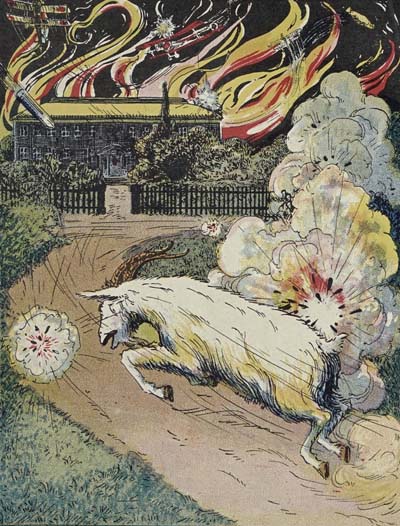
“I ran straight on, regardless of bombs dropping
all around me.”
(Page 124)

BY
FRANCES TREGO MONTGOMERY
AUTHOR OF “BILLY WHISKERS,” “BILLY WHISKERS’ KIDS,” “BILLY
WHISKERS IN THE SOUTH,” “BILLY WHISKERS IN CAMP,”
“ZIP, THE ADVENTURES OF A FRISKY FOX TERRIER,” ETC.

Illustrated By FLORENCE WHITE WILLIAMS
THE SAALFIELD PUBLISHING COMPANY
CHICAGO AKRON, OHIO NEW YORK
Copyright 1919,
by
The Saalfield Publishing Co.
| CHAPTER | PAGE | |
| I | Billy Whiskers Grows Homesick | 7 |
| II | Billy Unexpectedly Meets a Friend | 15 |
| III | An Inopportune Sneeze | 23 |
| IV | The General Recaptures Billy | 35 |
| V | Billy Nearly Kills the Cook | 47 |
| VI | Billy Relates Some of His Adventures | 59 |
| VII | Button Frightens Two Nurses | 75 |
| VIII | Billy Makes Plans to Leave France | 83 |
| IX | Button Discovers Spies in the Haymow | 95 |
| X | Button Makes the Farmer Fighting Mad | 109 |
| XI | The Chums on a Canal Boat | 123 |
| XII | Button has a Fight with a Wharf Rat | 135 |
| XIII | A Dog Cemetery in Paris | 143 |
| XIV | What the Chums Did in Paris | 153 |
| XV | Blown Up by a Submarine | 165 |
| “I ran straight on, regardless of bombs dropping all around me” | Frontispiece |
| PAGE | |
| Every man of them jumped as if shot | 30 |
| Billy gave one long, loud baa that resounded down the big, bare room | 66 |
| Away went Billy, jerking the cook around trees, over stumps and beehives | 92 |
| One thing Billy butted was a basket full of clothes | 118 |
| The first thing Billy knew, he was rolling over something soft that squealed like a stuck pig and that kicked like a calf | 148 |
Billy Whiskers in France

AS Billy Whiskers lay in an American camp somewhere over in France, he became very restless and soon had the blues from thinking of his dear Nannie so far away—away over in America, with that deep, deep, wide, blue ocean between them, infested not only with huge sea monsters belonging to the finny tribe, but also with death-dealing, quickly moving submarines and torpedo boats belonging to the German Kaiser.
“I want dreadfully to go home! Still I hate to risk my life on any ship that sails the seas these days, for it may be blown sky high at any moment, or sunk to the nethermost depths of the ocean. There is no way to walk around, and I don’t suppose I could get any one to let me go with them in an airship. So here I must remain, or trust my life to some troop ship returning to America for more soldiers.[8] I just believe I will do it! I have lost all interest in the War over here since my master was wounded and was invalided home. Home! The very word makes me so homesick I can’t see for tears. Well, I’ll just fix this homesickness, so I will! I start for there this very minute. It is a good dark night and I think I can slip out of camp easily as they have not been watching me so closely since my master was sent away.”
Suiting the action to the words, Billy jumped up, shook himself, took a long breath and said to himself, “Here’s luck to you, old fellow, on your long, long, perilous journey! And may you reach the other side and once more see your loving little wife Nannie and all your children and grandchildren!”
Then he gave a flick of his tail and started on a brisk run for the least guarded entrance to the camp, to try to sneak through.
“My, but it is lonesome traveling by myself!” he thought. “I do wish Stubby and Button were here to accompany me on this journey.”
Billy was so busy thinking of his old friends Stubby, the little yellow dog with a stubby tail, and Button, the big black cat with blazing eyes like buttons, that he reached the entrance to the camp before he knew it, and he managed to slip out without being stopped, for there was a jam at the gate caused by many big ambulances going out and army trucks coming in.
[9]“Humph!” said Billy to himself. “If I get over all my difficulties as easily as I got through that gate and past the guards, my journey will be a smooth and pleasant one.”
He had been traveling some time when he heard some one say, “Hi, there, Billy Whiskers! What are you doing outside of camp? Looks to me as if you were trying to run away.” This from a driver of an ambulance who knew Billy was not to be allowed to escape from the camp. “Come here and I will give you a nice red apple.”
“See anything green in my eye?” winked back Billy. “I know you! You would give me an apple with one hand and slip a rope around my neck with the other. Anyway, where’s your apple? I don’t see any!”
“Here, Billy! Stop, I tell you, and come here! If you don’t like apples, here is a handful of salt,” and the soldier held his hand out as if he had it full of salt.
But Billy was too keen for him. He had seen him close his hand over nothing before offering it to him. So he kept right on walking as if he had not heard the soldier.
“Say, Bill, this is no joke! It is the General’s orders that you are not to escape, but to be made to stay in camp until we go home. You are too valuable a goat to allow the Germans to make you up into chops and roasts. Besides, when we get home we want to show the goat that stole Von Luxemburg’s maps and plans from under his very[10] nose, and also butted or hooked all his staff into a heap in the corner of his own little room. If you won’t come back for apples or salt or coaxing, very well! I’ll have to lasso you, or shoot you in one of your legs so you cannot run away,” and the soldier turned his back to look for a rope in the ambulance, as he preferred to lasso Billy rather than shoot him. He was an expert with the lasso, as he had come from a ranch away out in Montana to join the army, and was considered the best hand with the rope in all Montana.
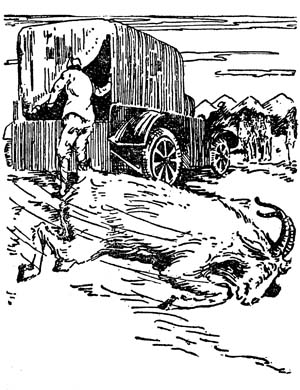
“Huh!” grunted Billy. “I must have run into Lasso Jake. If this is so, I better be getting a move on me and pushing my leg.”
As luck would have it, right before Billy was a creek, with a temporary bridge across it. Down the bank beside the bridge plunged Billy, for he knew the bank was so high that the cowboy soldier could[11] not throw his lasso so as to catch him. Instead of trying to climb out the other side of the creek, Billy kept on in the middle of the swift-flowing stream, swimming against the current, though he could not make much progress against it. Presently he heard voices and turning his head he saw two soldiers standing on the bridge and one was swinging a lasso over his head. Billy waited to see no more, but ducked. And just as his head disappeared under the water, he heard the splash of the rope as it hit the surface of the water just where his head had been.
“Good thing I ducked! If I hadn’t, they would now be pulling me to shore with a lasso around my neck. Gee, but that was a close call, and that cowboy soldier is some lasso thrower! I never saw his equal, even in a circus. I think he better get a flying machine and fly over the German line and watch his chance to rope the Kaiser or the Crown Prince, some of the Generals and other high monkey-monks.” And Billy laughed to himself at the spectacle of the Kaiser being made to walk into an American camp with a lasso around his neck. Billy forgot he could not open his mouth to laugh under water, and he began to choke so he had to stop swimming under water and come to the surface.
Just as he did so, his eye caught sight of a soldier standing on the bank of the stream with a lasso hanging from his hand ready to throw the moment Billy’s head appeared above the surface of the water.[12] He was about to dive again when he heard a cry for help from the bridge. The soldier turned and ran to rescue a man who had fallen into the water, calling as he went down, “Save me! I can’t swim!”
Billy crawled out of the stream and stood watching the soldier with the lasso trying to save his comrade. He was having a hard time for as the man went down he struck his head on a stone, which stunned him, and now he was being carried downstream by the swift current and knocked against the bowlders over which the water frothed. Try as he would, the cowboy soldier was put to it to catch up to him as the swift current bore his chum’s body ever and still ever ahead of him. But at last his comrade’s body caught between two rocks and was held there until the cowboy soldier overtook it. The cold water had revived the man, so that by the time his soldier chum reached him he was coming to his senses. Billy only waited to see that the man was alive and then he left them sitting in midstream, each on a big rock that raised its head above the water. He thought it wise to cut sticks for safety and ran into a thick woods he saw, which would serve to hide him from the soldiers should they cross the bridge and try to follow him. This, however, they did not do, knowing it would be useless to try to catch Billy when he had such a start.
As soon as he could, Billy found his way out of the woods to the road he had left. After following it for some time he found it led out to the main highway to Paris. This road Billy knew he must[13] follow or he could never find his way back to the seacoast. Once in Paris, he knew he must pass through it and then keep straight on in a westerly direction until he came to the English Channel. Once there, he would follow the coast until he came to a port from which boats were sailing for America. Then he would watch his chance to steal aboard and sail for home. Billy was very good at directions and from the moment he had landed in France he had taken special pains to keep the points of the compass straight in his head, so that if he ever wanted to return home alone he would find his way. Now it proved what a wise old goat he was, for all he had to do was to travel by the sun and North Star in a northeasterly direction until he came to Paris and from there in a westerly until he reached the English Channel, from one of whose ports he had disembarked when he came to France. But it was discouraging to think how very far it was and what privations and hardships he would have to endure and overcome before he reached his destination. But Billy Whiskers was a regular old soldier by this time and well used to hardships and hard knocks of all kinds. So he only heaved a long sigh and then ran all the faster, knowing that every step he took brought him just that much nearer home and Nannie.
“If I tried to count the steps I shall have to take before reaching home, it would be like counting the sands of the sea. I shan’t try, but just push on and I know I shall get there some day.”
[14]“Bow-wow-wow!” barked a big Dane in his deep voice.
“Bow! Wow! Wow!” came the short, sharp, snappy barks from a short-legged Scotch terrier as they bounded out of a gate beside the road, ready to pounce on Billy. They were followed by poodles, collies, St. Bernards, and all manner of dogs, both great and small. Billy thought he had never seen so many dogs of different breeds in one place in all his life. You see he had run into a dog hospital, and these were the convalescent dogs which were allowed to play together in the yard.
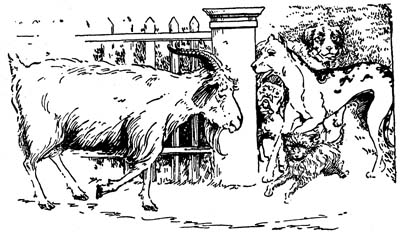
Not one of these dogs tried to bite Billy, and after they had given up trying to frighten him by barking in their fiercest way as if about to eat him alive, they quieted down and became as docile as lambs.

GOOD-MORNING, friends!” baaed Billy. “Would you allow a tired traveler to rest under the shade of your trees, and give him a drink of water? For I am a stranger in a strange land, and have traveled far. I am an American.”
“You an American?” exclaimed the dogs in chorus.
“Now we surely are glad to meet you!” barked the big Dane. “For if there is any place on earth we dogs have longed to see, it is America. Probably you will tell us about it?”
“Yes,” said another dog. “We have heard that every dog has his day over there and many of them two or three.”
“We have also heard,” added a French poodle, “that all dogs are free over there, and can go and come as they like, and that they are never tied up, shut in a house or muzzled. Is that true?”
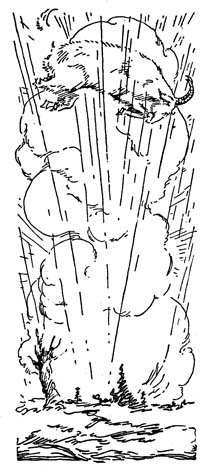
“Yes and no,” replied Billy. “It depends on where you live and who your master or mistress is.”
“Why, we have heard,” piped up a little black and tan, “that any dog can choose his own master or mistress, and that all he has to[16] do if he doesn’t like them or isn’t pleased with the way they treat him is to walk off and follow the first person he sees that he thinks he would like to live with, and that they will take him home with them and feed and house him.”
“Again you are partly right and partly wrong,” replied Billy. “It depends on whom you run away from and whom you pick out to be your new master or mistress. You might happen to belong to some one who was very fond of you, though you might not be fond of them. In that case if you ran away they would advertise and try to get you back, but if you had proved yourself to be a good-for-nothing dog, they would let you go and say ‘Good riddance to bad rubbish!’ and never bother their heads about you.
“Then again you might show poor judgment in selecting a new[17] master and choose one who did not care for dogs, and when he found you following him he might throw sticks and stones at you. So you see you can’t always be sure of changing masters successfully.”
“Did you just come from America?” asked a fourth.
“Oh, no! I have been over here nearly a year now, with the army.”
“You don’t mean to tell us that you have really and truly been with the army?”
“Surely not at the front!” added another in amazement.
“But I have!” Billy assured them. “I have crossed No-Man’s-Land many times, and been shot at and blown up once besides. See where a piece of my tail is gone? Well, I lost it at Verdun. A bomb exploded and threw me up in the air and also blew off part of my tail. I consider myself very lucky that it decided to blow a piece off that end of my body instead of the other, for if it had been my head in place of my tail, it would have killed me. I can’t get along without a head, but I can without a tail.”
“Haw! Haw! Haw!” laughed the dogs.
“You surely are a funny fellow!” said one. “Come on in and we will find something for you to eat and drink and also a place to rest. Then after you have rested, I hope you will tell us more of your experiences at the front. If you will do that, we will tell you our experiences in Paris before we left there, and we will introduce you to some of our celebrated police and Red Cross dogs who have been[18] in the war and been wounded or gassed. They will relate some thrilling adventures and hairbreadth escapes. To-night will be a good time, after our keepers have gone to bed. Then we can sneak out under the trees in the little patch of woods behind the big stables and while you brave soldiers swap tales of the war we who have never been near the war can listen.
“There goes one of our heroes now. See that dog crossing the lawn, wearing a Red Cross bandage on his chest?”
Billy turned and took one long look at the dog. Then without a word of warning he put down his head and bounded toward him, taking ten or twelve feet at a single bound.
The dogs stood spellbound. What was the big goat going to do? Butt their wounded hero? If so, why should he wish to butt a perfectly harmless dog he had never seen before? But had he never seen him before? Perhaps they had met and fought on the battlefield and were enemies. If so, they must all run and protect their hero from the long horns of the strange goat.
But when the dogs arrived within speaking distance they were overjoyed to hear the goat baa out, “Hello, old chum! How in all that is wonderful did you get here? I heard you were dead; that you had been seen with a Red Cross ambulance which had first been gassed and then blown up by a shell. One of your friends said he saw you with his own eyes sitting in the back of the ambulance when[19] the shell struck it, and the next thing he saw was the whole ambulance flying up in the air and then coming down in small pieces.”
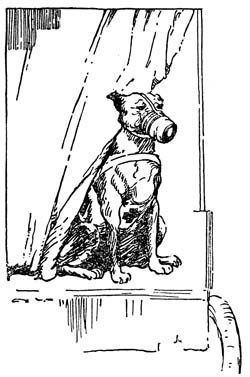
“What he saw all happened. I was there and sitting in the back of the ambulance with my gas mask on, for the signal had been given for all to put on their masks, and one of the doctors with the ambulance corps had just stopped and strapped mine in place when a shell hit us, and I found myself going up in the air at the rate of about a hundred miles a minute. When I came down, my mask had been blown off my face. How it ever was done without killing me or blowing my head off I don’t know, but it was. I thought I was all right until I began to see red, and I had a queer sensation in my head as if my brain were going round and round like a cat runs after its tail. Then I could not get my breath and I fell over, giving myself up for dead. But if you will believe it, the next thing I knew I opened my eyes and found myself in a long room with two rows of[20] beds in it, all just like baby cribs. And bending over me was a sweet-faced lady nurse. I found myself all bound up in splints and cotton batting. You see an interne to another Red Cross ambulance who had come to look for the wounded, if any had possibly survived the blow-up, had found me senseless on the ground. So he picked me up and brought me here as this hospital for dogs was on the way to the hospital where he was stationed. This is now my fourth week here, and I want to tell you that only angels in human form live here. They are so good to one! They have nursed me back to life. I was only slightly gassed and so my lungs are all healed and I am also over my shell shock. I shall likely go back to the front in another week.”
“You don’t mean that you are going back to the fighting line, do you?” asked a long white-haired collie that had fallen very much in love with the brave Red Cross dog. “Oh, why do you risk your life again?”
“Why do I risk my life?” in astonishment. “To try to save some brave soldier, whose life is a thousand times more valuable than any dog’s ever will be. Yes, I am going back and back and back as long as I have eyes, teeth or claws to go back with, until this cruel war is over.”
“Bully for you!” exclaimed Billy. “You make me feel like a slacker, getting homesick and running away from the army.”
[21]“Well, it is not too late yet to go back. I propose that you stay here and rest until next week and then go back with me.”
“I’ll do it!” said Billy, and they rubbed noses together to seal the bargain. “I hear a bugle. What is that call for?”
“Oh, that is our supper call,” said the Red Cross dog. “When they blow the bugle all the dogs that are running loose are supposed to go to the back kitchen door. There are long troughs there in which they put our suppers. Come ahead with us, and we will give you some food. There will be plenty for all of us and for you too, for they serve very bountifully here,” and all the dogs and Billy too moved off in the direction of the kitchen.
[22]

WELL, well, well! Whom have we with us?” exclaimed the cook at the dog hospital as he stood in the kitchen door in apron and cap ready to throw some more food in the dogs’ trough. “Bless my soul, I believe it is Billy Whiskers!”
Billy hearing his name spoken looked up, only to find himself gazing into the eyes of the cook who had once served the old General who had issued the strict orders for Billy not to be allowed to leave camp.
“Billy, you old rascal, come here and let me pull your beard for luck and old times’ sake! I will bet my whole month’s wages that you have run away from camp.”
All the time the cook was talking, he was walking toward Billy, wishing to get near enough to discover if the goat really wore around his neck a collar from which hung a medal engraved with his name.
“Here, Billy, is a nice big carrot for you. Don’t jerk back. I am not going to hurt you. I am only going to pat your head. Don’t you[24] remember the good old times in camp when I used to give you nice juicy apples and crisp lettuce heads?”
By this time the cook was standing close by Billy, pretending to pat his head, but every time he put his fingers through his hair, he tried to feel for the collar and Billy would jerk his head away. He was afraid the cook was going to try to take off his collar and Billy had made up his mind many moons before this that if ever any one tried to take it off he would fight them to the death. Just then a little breeze blew Billy’s hair up so that it showed the medal with some engraving on it, and the cook saw it read:
“This collar was presented to Billy Whiskers by the —th New York Regiment for his bravery in battle.”
“Well, Billy, I certainly am glad to see you! But I bet you have left many sad hearts behind you. I am homesick to be back with my old regiment, but I can’t go. Perhaps you haven’t noticed that I have a wooden leg and that part of my right arm is gone. If it was only my leg that was gone, I would be back, leg or no leg. But without my arm, I can’t shoot or carry a bayonet. It breaks my heart to be near enough to hear the roar of battle as I am here, and know I can’t be in it, killing off those pigs of Germans!”
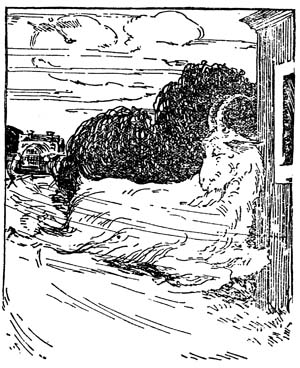
Just then from down the road came the sound of a high powered motor car, and the cook, stepping on a big stone to see the better, exclaimed, “It is the General, by hookey! And I bet he is coming[25] in here for a cup of coffee and a bite to eat, as he knows I can get it for him quicker than if he went on to the village restaurant, and better, too. He always said no one could make coffee like I can.”
Billy waited to hear no more, but started to find a place to hide, well knowing the General would carry him back to camp if he saw him, even if he had to take him in the auto with him.
The cook had forgotten all about Billy in his excitement at seeing the General. Billy took advantage of this to whisper to the dogs, telling them what was up and they all followed him as he ran toward the stable to try to find a place to hide. Just as Billy was about to turn the corner of the stable, he saw the General’s big touring car turn in the lane.
“Gee, fellows, I’m lost if that cook even mentions my being here! For the General is equal to sending a whole squad of soldiers to[26] find me and bring me back to camp. It would not be the first time he has done it, either!”
By this time Billy and the dogs had run into the little grove of trees spoken of before, but they stayed near enough the edge to be able to see if any one started to hunt for Billy.
“I tell you what I think would be a good plan,” said the Red Cross dog. “Have one of the dogs go back and hang around where he could hear everything the cook says to the General. In that way we will know whether or not he tells the General that you are here.”
“Excellent idea, that!” agreed Billy.
“Pinky, you would be the best one to go. You are so small that you can squeeze in anywhere out of sight under a chair or sofa, and listen to all that is said.”
“Oh, I don’t want to go! I am afraid they will kick me out if they should catch me listening. Besides, I want to stay here and hear Mr. Billy Whiskers relate his experiences. It is so dull here after Paris that I just long for some excitement, and I am sure Mr. Whiskers’ tales will be all that.”
“You run along, Miss Pinky, and I’ll tell you just what I tell them some other time all by yourself. Besides, you won’t miss much as our friend here, the Red Cross dog, can tell you adventures a hundred times more exciting than I can.”
[27]“Oh, no, he can’t. But I will go if you promise to repeat word for word to me all you tell them when we are alone some time.”
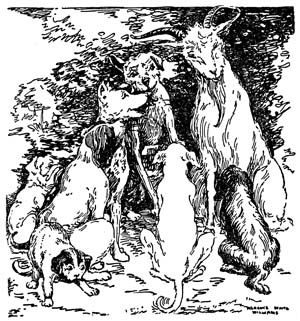
“Thank you very much, Miss Pinky.”
“Don’t call me Pinky! That is not my name! It is only a nasty,[28] mean nickname the dogs have given me because I am afflicted with pink lids to my eyes, the same as many poodle dogs. I just hate that name! But I can’t stop them from using it.”
“And pray what is your real name?” asked Billy.
“Rosie de la France. And it is such a pretty one I like to be called by it.”
“Well, hereafter I will call you Mademoiselle Rosie de la France. But I cannot see much difference between Rosie and Pinky, as they are both pretty much the same color.”
“Yes, if you look at it in that way. But it is the meaning hidden under it that I hate.”
“Never mind now what you are called, but run along or you will be too late to hear all the cook says to the General,” said the Red Cross dog.
The dogs then all lay down under the trees in a semi-circle around Billy and the Red Cross dog, so they could hear every word that was said by either of them, but every one of them kept an eye open for any one who might round the corner of the stable. Billy and the Red Cross dog had told them their most exciting experiences in the war, interposed by stories from the other dogs, when they heard the hum and buzz of the big motor as it drove out of the lane, and at the same time they saw Pinky running toward them so fast one could scarcely see her for dust.
[29]She ran into their midst panting and all out of breath, and between gasps tried to tell them that she had slipped into the sitting-room and sneaked under a big davenport with a cover thrown over it that hid her completely, but where she could hear every word that was spoken in the room. The General was sitting at a little table only a few feet from her, eating the good things the cook had brought to him on a tray.
“He seemed in a very good humor,” she said, “and was laughing and joking with two officers who were with him when I had the misfortune to sneeze. You would have thought I had thrown a bomb the way those three men jumped to their feet and reached for their swords!
“‘Who sneezed?’ thundered the General.
“‘There is some one hiding in this room!’ exclaimed one of his staff.
“‘Come out of the closet or from behind those curtains or wherever you are before I shoot!’ commanded the General.
“Of course no one came out, and I crouched down nearer the floor than ever and prayed that they would not lift the cover of that davenport and see me. I could see through the thin ruffle of the davenport cover and there they all stood stock still, with eyes searching every nook and corner of the room. Then what do you think happened? I sneezed again, and expected to be killed[30] on the spot, but I could not help it as there was a lot of moth balls right under my nose, put there to keep the moths from eating the carpet. Well, if you will believe it, every man of them jumped again as if shot. I could see their feet leave the floor. And one of the staff said in a stage whisper, ‘Spies behind that curtain!’ Then he marched toward it with sword in hand, and brushed the curtain aside. Of course there was no one there. Then the other staff officer flung open the closet door. No one there! Still they had heard two distinct sneezes. The General stalked to the window and looked out as it opened on the ground. I expect he thought some one might be hiding under the window, listening. No one there! Only a flower bed with bees droning and buzzing over it. And horror of horrors! As he leaned out of the window and the staff officers were looking behind chairs and under tables and even up to the ceiling I gave another big sneeze. I sneezed so hard it nearly blew my head off. I expect it was because of holding it in so long.
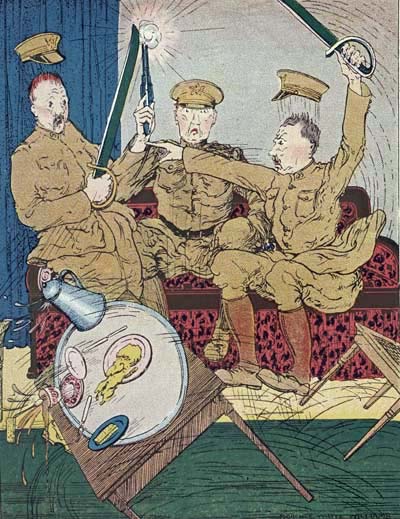
Every man of them jumped as if shot.
“This of course was my undoing. One of the staff dropped on one knee to look under the davenport. The General jerked his head back through the window, and heard the staff officer exclaim in a loud voice, ‘Only a measley, sneaking little poodle dog!’ and with that he stuck his sword under the davenport to prod me out. It would have cut my leg off, or run right through me, I am sure,[31] but just then the cook opened the door to come in to remove the dishes and I jumped over the sword and ran between the legs of the staff officer who was standing between the davenport and the door, and simply flew back here.
“When I got outside I did sneak around under the window, and heard them all laughing over the fact that a little dog’s sneeze had given them such a fright. The General said ‘Better be on the right side than on the wrong, and many a warning as small as a sneeze gone unheeded has cost many lives. I would rather be too careful than not careful enough,’ You see they all thought I was a spy hidden in the room somewhere. Then I heard the cook say, ‘General, has the Regiment still got the big white goat they used to have as a mascot?’
“‘No, I am sorry to say he has been missing since a week ago to-day, and we cannot get any trace of him. One of our ambulance drivers saw him on the road to Paris, and tried to catch him, but he could not. He nearly had him when a friend fell off a bridge into a creek, and would have drowned had he not left the goat and gone to his assistance. I would not have lost that goat for a thousand dollars. He knows more than most men.’
“‘Well, General, you have lost your thousand dollars. I know where your goat is at this minute.’
“‘You do? Well, produce him and the money is yours. You[32] know Billy is like the proverbial flea. Now you have him and now you don’t. If you will show me that goat now, we’ll have him in my office at camp headquarters to-morrow. I’ll give you a check for one thousand dollars, too.’
“‘I’ll do it for you gladly, General, as you have done me many a good turn, but I cannot accept your money. And now if you will step to the door, I will show you Billy, the Mascot of the Regiment, quietly eating out of a trough at the back kitchen door.’
“The General and his staff picked up their caps and swords and followed the cook around the house to the dogs’ trough, but as you know, no goat was there.
“The General had to laugh at the blank look on the cook’s face when he turned the corner of the hospital and saw that the goat and all his dogs too had disappeared as completely as if swallowed up by an earthquake.
“‘Well, that beats everything I ever saw! He was here a few minutes ago. In fact, just when you drove in eight or ten of our dogs with Billy in their midst were all standing here eating and now not an animal is in sight anywhere. It beats all! I can’t explain it!’
“‘I can,’ said the General. ‘That goat recognized my car, thought I was after him and lit out. He has done it before, and I doubt[33] if any of us will ever see him again. I tell you he is sharper than the devil, whose cloven hoof he has!’
“‘General, will you kindly do me the favor to wait till I blow my dog whistle? That is the signal for all the dogs to gather here. We will see if Billy does not come running with them.’
“The General waited. The cook blew his whistle repeatedly but no dogs showed up. Then the cook ran to the barn and around it, looking in every known hiding place the dogs had, but no goat or dog did he see. And he came back to the General and said, ‘Well, General, I shall have to give up beaten. He has gone and, what is more, he has taken every dog with him that is not confined to a hospital bed. I can’t find hide or hair of any of them, but I am so mad that I am ready to devote months, if need be, to finding that tricky goat. And when I do I will return him to you even if I bring only his hide, horns and tail!’
“‘Well, here is luck to you, but I hope you will bring him alive, and not in pieces for I could make use of a live goat, but I would be hard pressed to know what to do with a dead one!’
“Then with a hearty laugh all around, the General and his staff got into their auto and whizzed out of the lane, and I scurried back here to tell you all this.”
[34]

THANK you, Miss Rosie de la France, for finding out so much for me. You certainly did have a narrow escape when under that davenport and you sneezed for you might have had your legs cut off by that officer’s sword. So the cook is going to catch me and bring me to the General, alive or dead, is he? I can tell him right now that he will never be able to give so much as one hair of my beard to him!”
“Here comes the cook now!” exclaimed one of the dogs. “We better scoot!”
With that they all jumped up and ran in different directions, Billy choosing a long, circuitous course that would bring him out on the Paris road. Then and there he gave up the idea of returning to the war and entering the army again with the Red Cross dog.
He soon reached the road, and once on it he put his head down like a race horse to resist the wind, and ran as he had never run before, jumping stones, ditches and uneven places on the roadway until he was completely winded. As it took a great deal to wind Billy Whiskers, you may know he traveled many, many miles and left the dogs’ hospital far behind.
[36]“I shall stop running when I come to the next stream, get a drink, take a bath, and eat whatever I can find by the roadside. Then after a good rest I shall start on again,” he planned.
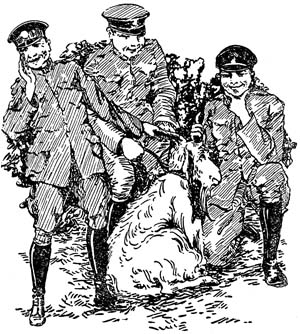
All of this he did, and he was hidden behind a big bush beside the road down by a stream, watching the big ambulances and high powered touring cars go thundering by in endless procession when, all plans to the contrary, he dropped asleep. It seemed but a minute to him after his eyes had closed when he felt something tight around his neck. He tried two or three times to loosen it by stretching his neck without taking[37] the bother to open his eyes, but when at last he did open them, he saw standing around him three officers with broad grins on their faces. And behind them was the old General in his touring car, waiting for his officers to bring Billy to him!
“I certainly was caught napping that time!” thought Billy to himself. “And they have me all right enough now with this strong rope around my neck. It is queer I did not hear them coming! It must have been I was so tired that it made me sleep like the dead.”
“Come, get up, Billy, you old rascal, and come along without any fuss! For you are a smart enough goat to see that there is no use resisting with a rope around your neck and five men against you—we three officers with the General and his chauffeur.”
Yes, Billy saw all this and as he walked along quietly behind them he wondered where they were going to put him. They could not mean to tie him behind the car as no goat, even if fitted out with twenty league boots, could keep up with the General’s car at the rate he drove. And with three staff officers, the General and the chauffeur he could not see where there would be room inside the car.
“Well, Master Billy, you thought you had escaped from me for good, didn’t you? But you see you haven’t. And, what is more, you won’t escape in a hurry again, for I propose taking you right along with us, though it will crowd us some. Here I was blustering[38] about and scolding the chauffeur for his carelessness in not seeing that we had water enough in the car to carry us through when the very lack of it led us to finding you. He got out to carry a bucket of water from the stream and found you so fast asleep behind the bush that you had not heard our approach in the car or even the chauffeur’s steps when within three or four feet of you. He had time to come back to the car and tell us what he had found, get a rope and the three officers to help me capture you while you slept on. Now, my dear Billy, you are my prisoner. If you behave, you shall have every care and comfort, but try to escape, and I shall send a bullet through you, for I shall stand no nonsense. Hear that?” and the General pulled Billy’s beard in a joking manner. But Billy knew he would do as he said if he tried to escape or cut up any monkeyshines. So he quietly let them help him into the car, where he stood between the two seats in the tonneau while they tied him to the rod at the back of the front seat on which the extra robes hung.
Billy was experiencing one of his rare moments of dejection and discouragement, for he knew if they once succeeded in getting him back in camp it would be very difficult indeed to escape as they would use every precaution to keep him there and they might even put him inside the electrically charged barbed wire fence where they kept the German prisoners. That would be horrible indeed!
[39]“I must think up some way to escape before we reach camp or I am lost,” thought Billy. “How I ever can unless we have a breakdown is more than I can tell!”
Presently they came to the dogs’ hospital and whizzed by it at full speed, but not too fast for Billy to see standing at the gate the cook, or for him to get the cook’s expression of surprise and wonder when he saw Billy in the General’s car. Billy also saw the Red Cross dog close at the cook’s heels.
“I am glad they saw me for now the dog will know what has become of me,” thought Billy.
Presently the big car slowed down and went bumping and sliding over a terrible piece of road that was being repaired.
“Now would be my chance to jump out while they are going slower if I only were not tied. And I can’t chew the rope loose right under these men’s noses, either. Perhaps when they stop for supper I may get a chance.”
Just then there was a terrible explosion as one of the tires blew out, and at the same time the car slipped on the soft, shifting gravel with which they were repairing the roadway and slid down into the ditch.
“Now we are ditched and in for a long delay!” exclaimed the General. “I simply must get to camp with these plans within the next three hours. Stop the first car that passes here and I[40] will make whoever is in it take me to camp while you officers stay here and help the chauffeur repair the damages and get the car out of the ditch. That should not be a hard job but only a tedious one for the men working on the highway can help you out of the ditch and the chauffeur can mend the tire for I expect the explosion was due to a bursted tube.”
It was one thing to say get the men on the road to help but where were those men? Nowhere in sight, but several miles down the road working on another bad stretch.
“I hear a car coming!” exclaimed the General. “Make ready to stop it, Lieutenant Strong!”
In less time that it takes to tell it, the car had come, stopped and taken the General aboard. As the General waved good-by to them, he called back, “I wish you luck, gentlemen! I will keep your supper hot for you!” to which Billy replied with a loud baa. This made the staff officers laugh, for his voice sounded exactly like a cross old man saying “Bah!” in derision to the General’s joking remark.
As soon as the General was out of sight, the officers fell to and tried to lift and push the car up into the road. But they might as well have tried to move a huge rock for it did not so much as budge an inch. It was embedded too deep in the sand and loose gravel.
[41]“This is most provoking!” said one of the officers. “It means that we must try to stop some passing car and get them to help us. When they see it is the General’s car that is in trouble they will feel in duty bound to aid us, no matter whether they really want to or not. But I just hate the job of stopping any one for that purpose as it always makes any one provoked to be so hailed on the road.”
“Here comes a farmer driving a pair of horses hitched to an old wagon. Let us stop him. I think his horses can pull us out if we all push,” suggested another of the officers.
“Now is my chance!” thought Billy, and he was just about to chew at the rope around his neck when the farmer came up and stopped opposite them to see if he could help them any.
“Yes,” replied one of the officers. “You are just the man we have been looking for to give us a lift out of this ditch.”
“Wal, that is a purty durn big car of your’n. But I guess my hosses kin pull her out. That is, if I only had a rope to tie to the back of my wagon, but I can’t get hide nor hair of any rope or chain or nothin’.”
“We have a rope,” answered one of the officers. “We always carry a good strong rope for just such purposes under one of the seats. Here, Jean, get it out and we will see how soon these horses can pull us out.”
Jean, the chauffeur, stopped working on the tire to get the rope,[42] but alas! when he looked under the seat no rope was there. From the fury into which the officers flew, Billy thought they were going to kill the fellow on the spot for his carelessness, first running out of water and now finding no rope.
“You are discharged the minute you get us to camp!” roared the superior officer. “And what is more, I shall see that the General has you severely punished. What if the enemy were at our heels and we were trying to escape from them, or we had important dispatches that must get to Headquarters to change some movement of the army that would mean the saving of hundreds and thousands of lives?”
At last the chauffeur managed to say, “Could we not use the rope that is around the goat’s neck to pull the car out of the sand? It is a very long one. In fact, it is the rope that belongs under the seat. In my excitement I forgot I had used it to tie the goat.”
“Of course we can! And to keep him from escaping we can tie him with one of the farmer’s reins.”
“Here, you Billy, stand still while I take this rope off your neck.” The chauffeur stood on the step, leaning through the open door of the tonneau as he untied the rope that was around Billy’s neck, with the farmer standing behind him ready to hand him one of his reins to secure Billy again.
“Here is a good chance to escape,” thought Billy. “To be sure,[43] I will have to run the chance of one of the officers shooting me, but I will take it. For I would rather be shot than carried back to camp and shut up with a lot of German prisoners.”
At the moment Billy was forming his plan of escape, all the officers were fussing on the car at one place or another trying to dig out the wheels by shoveling a path for them in the sand.
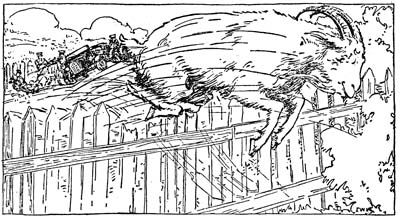
Seeing all this, Billy made up his mind he would butt the chauffeur so hard he would knock all the breath out of him so he could not cry out and give the alarm. So just as the farmer stepped close behind the chauffeur to hand him the rein, and the rope was off Billy’s neck, Billy gave a plunge forward and planted his head in the middle of the chauffeur’s stomach, sending him backward[44] with all the breath knocked out of his body and with such force that he hit the farmer and sent him sprawling on his back, with his head hanging over the ditch. Now just as his head hit the ditch, the officer who was shoveling a path for the car raised up and the farmer in turn hit him and sent him flying into the ditch. There were three men disposed of in one butt. That left only two to shoot or pursue him, and both of these were on the far side of the auto and had not noticed anything as their heads were down and they were busy tugging big stones out of the way of the wheels. So Billy had a good start of a hundred yards or more before the officer who had been sent rolling into the ditch could right himself and give the alarm. By the time he found out what really had hit him, Billy had run to the side of the road, jumped a fence and disappeared in a thick woods. The officer’s anger knew no bounds, and he swore a blue streak and fired two shots after Billy.
“Thunder and lightning, I would not have had that goat escape for a million dollars,” he exclaimed.
“Bet your small change first,” counseled another.
“Yes; his escape puts us in a pretty light, doesn’t it? Five able-bodied men not able to keep one goat in an auto! To be sure, one man was not a man, only an idiot of a chauffeur,” he stormed.
“Say, Jean, you better stop working on that tire and go hang yourself with the rope in your hand!” scoffed the third, “for you[45] are likely to be hung in earnest when you get to camp for all the mistakes you have made to-day, to say nothing of losing the goat besides.”
But poor Jean heard this not at all for he was still unconscious from Billy’s terrific butt.
“Some goat, that, misters!” said the farmer in a dry way.
“I guess you would think so if you knew just a little of his history!”
“You don’t mean to tell me that that there goat is the one they call the —th Regiment’s mascot, and the one the papers are always telling about?”
“Same goat!”
“Wal, I’ll be gosh darned!” in astonishment.
Jean did not come to and one of the officers had to run to the auto for restoratives while Jean was stretched out on the back seat with his head in a second officer’s lap. In falling he had hit his head on a stone and the wound was now bleeding profusely. The soldiers tied their handkerchiefs around his head and tried to stop the flow of blood as best they could and after the car was out of the ditch they drove so fast they were in danger of breaking their necks or having the car turn turtle at every turn.
When at last they did reach camp and got the chauffeur into the hospital and reported to the General for duty, they were in a pretty mess and looked as if they had been in a pitched battle[46] with the enemy for they were covered with dirt and blood from their heads to their heels, which made the General exclaim when he saw them, “Well, bless my soul, you are a nice looking crowd! Whatever has happened to you?”

WHEN Billy was sure he was not being followed, he went a circuitous way back to the dogs’ hospital that he might stop and have the fun of telling them how he escaped from the old General.
When at last he approached the hospital from the back, he saw no one about, not even a dog or cat. But all the windows and doors were open so he knew they were at home and around somewhere. He cautiously approached, keeping a sharp lookout for the cook, for he did not want him to catch him and deliver him into the old General’s hands. He was just rounding the pig pen when he saw driving into the lane one of the field hospital ambulances.
“I expect it has come with a load of wounded dogs. I’ll just stay here and watch,” pondered Billy.
The hum of the ambulance motor was heard in the hospital and presently a young doctor and two trained nurses appeared at the door ready to receive the new patients. Billy could hear the low groans and yelps of pain from the dogs as the stretchers were lifted and the dogs were carried inside. Several dogs tagged in after[48] the stretcher bearers and as Billy had always wanted to have a look about the hospital wards, he determined to follow.
Presently he found himself standing in the doorway of a long ward with tiny beds like babies’ cribs lining the wall all the way around, and in each bed was a dog, either curled up asleep or sitting upon its hind quarters watching the newcomers.
Some of the dogs had their legs in slings; others had bandages over their eyes, while others were in plaster casts. Beside each cot was a little stand on which had been placed the medicine for that particular dog, along with a bowl of drinking water.
“Gee!” exclaimed Billy. “A dog would not mind being sick in these quarters with all this comfort and the pretty nurses and the kind doctors to wait upon him. But what is that? Do my eyes deceive me, or am I seeing things? If so, I am a sick goat and I shall crawl into the first cot I find that is big enough to hold me. If I am not seeing things, then that big, black cat on the window sill is my dear old friend Button from the United States of America. Such being the case, Stubby, the other member of our trio, can’t be far off. Perhaps he is one of these wounded dogs that just came in the ambulance. I know how I’ll soon find out. I’ll just baa and if it is Button sitting in that window and Stubby is in one of these beds, I bet it will surprise them so that even if they are half dead they will come to life long enough to answer my baa.”
[49]
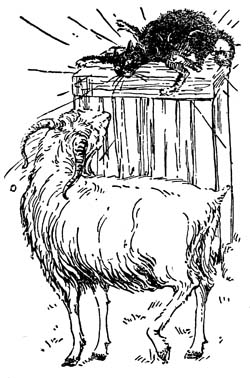
Billy gave one long, loud baa that resounded down the big, bare room like a loud clanging bell. Every person and dog in the long hospital ward jumped as if a bomb had exploded in the room, and some of the weaker and more timid dogs fainted dead away from the shock. They were weak from loss of blood, and fatigued from their hard work on the battlefield, having been without anything to eat or drink for many hours. And I am sorry to say that Stubby was among them. Billy listened in vain for a familiar bark, but he was going forward to speak to the cat which meowed with joy in response to his baa when a doctor picked up a window pole and made towards Billy, while another grabbed the cat and threw it out of the window before the cat knew what was taking place. He had been so delighted to hear Billy’s familiar baa that he did not even see the man approaching.
[50]The doctor chased out Billy and all the dogs that had tagged in, and shut the door behind them.
Now Billy had not heard the answering meow, and so was still in some doubt as to whether or not the cat was Button, or if his old friend Stubby was one of the wounded dogs. As he thought of this he walked toward the back of the hospital into the yard. All the dogs which had been driven out with him were following him and telling him how they had enjoyed the commotion he had caused, and were plying him with questions as to how he got away from the General and back so soon, and how far he had gotten on the journey before he was caught. Billy paid not the slightest attention to any of them. In fact, he did not even hear what they were saying, he was so busy thinking of his two friends and wondering how they ever got to France for when he had last seen them they were in New York state.
He had gotten just this far in his musings when he turned the corner of the hospital and saw the black cat sitting on a packing box, looking up at the window from which he had been thrown. Billy knew in a second that the black cat was his old friend sure enough. On seeing Billy, the black cat made one spring and lit squarely on Billy’s back. Then he jumped off and ran up a tree, then down and over and under a wheelbarrow that was standing near, then in among the dogs that were surrounding Billy as if[51] to try to save him from the onslaught of this crazy acting cat which they all thought was having a fit.
Yes, it was a fit, but not from sickness, but rather from joy at beholding Billy alive and in the flesh when he had been given up long ago for dead.
Presently the cat quieted down and came and stood before Billy, and gazed and gazed and gazed into his eyes without saying a word. And Billy gazed back, wondering in his own mind what on earth had made the dignified Button act so crazily. After this long scare, the cat meowed, “Well, Billy, old fellow, I see it is really you in the flesh and not some other goat that looks like you. But how you ever managed to keep from being killed is more than I know. All of us had given you up as dead and mourned for you for months. Nannie, your poor little wife, is still bewailing your loss. You see, we thought you were done for from an item in the newspaper, which I heard my master read aloud one morning. I can’t give it to you just as it was written, but the gist of the matter was that the —th Regiment with its celebrated white goat mascot, Billy Whiskers, had marched to the front on May twenty-first but that, sad to relate, few returned and those that did were badly wounded. A great many had been taken prisoners and whether their mascot had been killed or captured, those returning did not know. Stub and I did not feel you were killed, and that if you were captured[52] you would find some way to escape. We then and there made up our minds to cross the ocean and look for you, for we were bound to find you if you still lived. And here we two have stumbled into you just when we had given up all hope of you being alive.” And off went Button, running up one tree and then another, around in circles and jumping over and through hedges and flower beds. Once he made the dogs all laugh for by mistake he ran up an old gardener’s back as he was stooping over digging away, thinking it was a stump, he was so nearly the color of the trees and grasses of the garden. The old fellow was so surprised that he fell headlong into the ditch he was digging.
“You see, Billy, I am so delighted to see you I can’t keep still.”
“I am just as glad to see you, but I can’t jump around like a crazy loon to show it. Come here until we rub noses in the place of a kiss!” said Billy.
“I must run and tell Stubby. He will be so delighted it will help him stand his pain and he will get well sooner. But how am I to get into this blooming building again? Aren’t there some back stairs, fire escapes or something of the like I could go up to get to his ward?”
“No, there are no fire escapes on any of these country buildings that have been turned into hospitals,” replied the Red Cross dog. “What we need more than fire escapes is a bomb proof cellar[53] large enough to carry our patients into when we have an air raid.”
“I’ll tell you how you can get in,” spoke up Pinky. “Wait until the nurses begin to carry suppers up to their patients, and then you can creep along at their heels and, being black, you can hide in the shadows until they leave the ward. Only the night nurse will then be on duty and she will soon fall asleep. Then you can creep out and go to your friend’s cot and tell him all the news.”
“Splendid idea! Thank you very much! Won’t some one introduce me to this dog?”
“Goodness gracious me! Do excuse me, Button, for being so impolite, but joy at seeing you drove all my good manners out of my mind. It is not too late now, and I wish to introduce you to all my friends you see standing around us.”
After they had all been presented to Button, they went over to the grove of trees where the dogs always went when they wished to talk without interruption, and they agreed to stay there until time for the patients to have their supper, for they were very curious to hear how the big, black cat got all the way from the United States of America to France, and also to hear how Billy got away from the old General.
They were all trotting along as fast as they could through the barnyard with heads down, thinking what a fine time was in store for them listening to the goat and cat relate their adventures, when the[54] Red Cross dog heard a peculiar croak and, looking around, he saw the cook astride Billy’s back, trying to get a rope around his neck. Now the rope had just slipped over Billy’s head and the cook gave it a pull that nearly strangled him and made him make the croaking noise that caused the Red Cross dog to turn around.
“Gee, that is too bad!” sighed the dog, and Pinky said:
“Just my luck! I never counted on having a good time that something did not come along and spoil it! I expect the cook won’t rest now until he has delivered Billy to the old General.”
“I wonder where the cook is going to put him now he has him,” said one of the dogs.
“Goodness knows! I don’t!” replied Pinky.
“Why, look! He is going over toward the hospital with him,” said another.
“Let’s follow and see what he is going to do with him,” suggested the Red Cross dog. “But keep out of sight and don’t let the cook know we are following him,” he warned.
So they all separated, slinking along in the shadows, dodging behind trees, boxes and barrels, their eyes glued to the cook’s back.
Instead of hiding, Pinky walked out in plain sight, and trotted along at the cook’s heels, and she heard him mutter to himself: “I’ll just put this foxy old goat in that vacant room in the hospital[55] and lock him in and then we will see if he is smart enough to butt down the hospital!”
“He might not try,” whispered Pinky to herself. “But I bet he could butt down the door if he took it into his head he wanted to do it.”
The cook got Billy to the foot of the stairs leading to the porch of the hospital. Here the cook went ahead and tried to lead Billy up. But all of a sudden Billy planted his fore feet straight in front of him and pulled back. His quick stop accompanied by the jerk nearly cracked the cook’s head off his shoulders and Billy, giving a second pull just then, jerked the cook backwards off the steps where he landed at the bottom, sitting straight up and facing Billy, with their noses not three inches apart. He looked so comical with his legs spread apart, cap on one side of his head and his hair standing straight up, that Billy had to laugh. Surely the cook’s startled expression was a study as he gazed into Billy’s eyes.
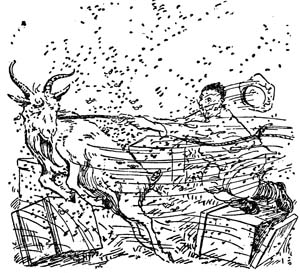
On seeing this, the dogs all laughed out loud. The cook jumped up and looked around to see who was making sport of him, but of course he saw no one. So he thought some one must have been leaning out of one of the upper windows, then quickly ducked after they laughed. Anyway, he would make Billy pay for his discomfort. He jerked him up the steps and was about to shove him into the room[56] he had just unlocked when Billy gave a big, big pull and started to run off the porch. He ran so fast and was so strong that he jerked the cook along as if he had been a rag. Along the porch they went until Billy came to one end. Here there were no steps, so Billy just gave a big leap and landed in the middle of a flower bed, the cook sailing on behind, hanging on to the rope that was still around Billy’s neck. And it was a lucky thing for the cook that there happened to be a nice soft flower bed right there for him to fall in; otherwise he might have broken his back.
Billy gave another pull to the rope which brought the cook to his feet, and away went Billy across the lawn and down the lane, jerking the cook around trees, over stumps and beehives, upsetting them and causing all the bees to come out to see what was the matter.[57] For a while the air seemed to Billy to be black with bees. Then they stung the cook so that he let go the rope and rolled in the grass to try to keep them off his face. But they settled on him thick as flies on a molasses covered paper.
“Run for the watering trough in the barnyard!” called a nurse who saw all this, and the cook did, diving headfirst into the water to drive off the bees, which it did effectively.
Billy thought they could not sting up through his long hair, and he stood enjoying seeing the cook trying to fight them off. But all of a sudden one bee stung him on the ear. The pain made him frantic and he started for the watering trough, regardless of the fact that the cook was still sitting on the edge, rubbing his swollen face and hands and putting mud on them to take out the burning, stinging pain. Strange as it may seem, neither the cook nor Billy paid the slightest attention to each other. They were too much occupied each in trying to stop the pain of the bee stings.
Presently the cook got up and limped into the kitchen, saying to himself as he went, “That goat sure has the devil inside of him! I’ll never try to capture him again for the General. No, not for the President of the United States himself! I am done! What with having my head jerked off, my spine driven through the top of my head, and my legs nearly broken off, to say nothing of[58] running me into stumps, trees and beehives, I’ve got enough of that goat, even with one thousand dollars as a reward offered for his return. No! No more at all, at all, do I ever have anything to do with goats!”

OH, Billy, are you hurt?” whined Pinky at his heels.
“Yes. I have a bee sting on my ear that hurts like the very mischief. And, by Jove, I believe I have another over my eye for it is fast swelling shut.”
“Come with us,” said the Red Cross dog, “over to the grove before it closes entirely and you can’t see where to walk. When we get there I’ll fix you up for I know what is good for stings.”
On the way they had to cross over a little stream with a soft, muddy bank, and the Red Cross dog stopped there and said, “Now stoop down and rub your head in the mud so it will cover your eye and get into the lid where the sting is. As soon as the mud closes over it you will find that the pain will stop almost instantly. I have seen my master rub mud on too many stings not to know it is a sure cure.”
[60]“Gee, but I hate to get that nasty mud in my ear and all over my face!”
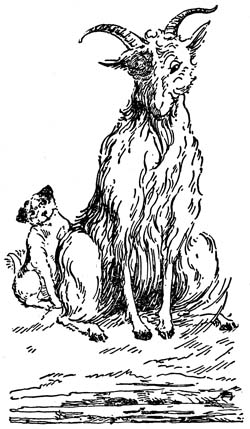
“Never mind the dirt! It is clean mud and will dry and fall off itself so it won’t be hard to get out of your ear or off your face. Should it be, you can just shut your eyes, hold your breath and dip your head up and down in the trough until your hair is as white as snow again.”
“Well, I’ve got to do something, dirt or no dirt, for this pain is setting me crazy. So here goes!”
Billy knelt down and rubbed and rubbed and rubbed one side of his head up and down in the soft mud until it was as brown as an African’s face. When at last he stood up all the dogs tried not to laugh, but finally they went off in a perfect howl of merriment.
“What you laughing at?” asked Billy.
[61]“Just step here where the water is clear and look at yourself,” said the Red Cross dog.
This Billy did, and then he too began to laugh, for he was a most comical sight. One side of his face looked twice as large as the other, and on this side the eye was swollen shut with a bump as big as a hen’s egg standing out above it. And this whole side of his head was as brown as could be while the other was white, which made him look exactly as if his head had been made in two parts and they were misfits.
“Hurry!” said a hound that was with them. “We better get to the woods. I hear some one coming!” and away scampered the dogs and goat to the grove, their old trysting place.
I should like to have had a picture of them as they stood beside the clear stream, with the dogs surrounding the mumpsy looking goat, laughing at his discomfort.
There was the big St. Bernard, majestic and tall; the long, sleek, black hound with tan ears and feet; the fluffy white French poodle with pinkish eyes; and the Red Cross Belgian dog with his short, sharp ears, wide-awake face and short, glossy black hair, while over his breast was still the white band with the Red Cross on it.
Once in the woods and comfortably fixed, Billy related to them the story of his life and how and where he first met the big black[62] cat they had just seen, and the little yellow dog that was now wounded and in the hospital.
“Before you begin, Billy,” said the Red Cross dog, “I want to ask if the pains in your ear and eye are better?”
“Why, bless my soul, they don’t hurt at all! Even the swelling is going down. You sure are some doctor!”
“Now go on with your story, and excuse me for having interrupted you.”
“Well, to begin with, all three of us—the little yellow dog named Stubby, the big black cat called Button and myself—were born in the United States of America. We have known each other for years and been great chums. Why, we have scarcely been out of sight of one another for years until I joined the army. My regiment left so unexpectedly for France that I had no way of letting them know I was going, as they were away at the time on a vacation. And I bet you we will find out when I get a chance to talk to them that the minute they got home and found I was gone they managed to make friends with some of the soldier boys and made themselves so useful that they brought them along. Why, do you know that we three have crossed the big American continent twice, and we have been from Northern Wisconsin away down to the Gulf of Mexico? Not being satisfied with that, we have crossed the Pacific to Japan and we all three were in the war between Russia and Japan as mascots.[63] Before that we crossed the Atlantic Ocean, sailed through the Straits of Gibraltar and over the Mediterranean Sea to Constantinople. We are some little globe trotters, don’t you think?”
“Heavens! It makes my head dizzy to even think of it!” said Pinky.
“And you lived to tell the tale!” said the big St. Bernard.
“Yes, as I shall live to tell the tale of this war and about all of you to my grandchildren when I get home,” replied Billy.
“But you must have had a great many narrow escapes and thrilling experiences,” suggested the hound.
“I should think so! More than would fill a book the size of Webster’s dictionary. As for hurts, bruises and scars, I have been wounded so many times I don’t believe there is a square inch on my body that has not a scar of some kind on it. It is a good thing I am not a hairless goat, like those little hairless dogs they have in Mexico, for if I was, I would look like a tattooed man,” said Billy.
“Tell us of your most thrilling experience,” begged the Red Cross dog.
“Heavens! I have had so many hairbreadth escapes I would not know which one to pick out.”
“Tell us two or three of them,” said Pinky. “I just love to hear you tell of your adventures.”
“Yes, do!” exclaimed all the other dogs in chorus.
[64]Just then Billy gave his head a shake and a big clod of dry mud fell off his eye, leaving it practically well and the swelling gone.
“A mighty quick cure, I should say,” remarked Billy. “I recommend you, Doctor Red Cross!”
“Turn your head to one side and shake it and I think the rest of the mud will fall off. Then by holding your head well over on one side, the mud will fall out of your ear.”
All this Billy did.
“My, but it certainly does feel good to be able to see out of both eyes and hear with both ears once again! So you all want to hear of some thrilling adventure I have had? Well, let me see which one I shall tell first, about being wrecked at sea, falling in the crack of an earthquake that opened at my feet, or being blown up by a bomb in this war or—”
“Oh, don’t tell us anything about bombs!” exclaimed Pinky. “They are too common around here. We want to hear something we don’t know so much about.”
“Well, then I guess I’ll tell you about the earthquake experience. It happened when Stubby, Button and myself were in San Francisco.
“One day we were trotting along one of the streets in Chinatown, the name given to the Chinese quarters of that city. It was about lunch time, and Button had jumped up into a milk wagon that had stopped opposite us, to see if he could not find some milk to drink,[65] Stubby had run into a butcher shop to see if he could find some meat, and I decided to sneak into some Chinaman’s back yard and see what I could find to make a meal.
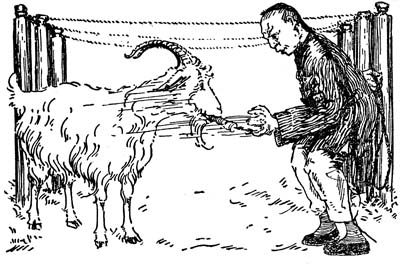
“Presently I came to a long, narrow, dark passageway that led to a back yard. I sneaked in quickly, so a Chinaman looking out the window would not see me. But alas, he did, and I had scarcely gotten half way down the passage when I heard a door slam shut behind me and a bolt slipped into place. I knew before I even turned around, when I heard that bolt slip into place, that I was caught in a trap like as not. But I went right on pretending I did not hear the Chinaman shut the door.
[66]“The end of the passage opened into the back yard of a Chinese laundry and there were lines and lines stretched from one side of the yard to the other, but there were no clothes hanging on them when I went in. Without paying any attention to me, the Chinaman began to take down the lines, but instead of taking them all down, he only took a short one, I noticed. Then he made a slip knot in one end, whistling as he walked toward the laundry. He went inside, still without looking at me, and I was beginning to think I had been mistaken and he had not seen me enter and that the rope was not to tie me up, when out he came with a carrot in one hand, the rope still in the other.
“He came straight toward me, holding out the carrot in one hand while he kept the other behind him. As he approached me he kept saying, ‘Nice little goatee! Nice little goatee! Have a carrot!’
“And I thought to myself, ‘You might as well try to catch a bird by putting salt on its tail as to try to catch me with a carrot in one hand and a rope hidden in the other behind your back, especially when that rope has a slip knot in it. Oh, no, Mr. Chinaman, I was not born yesterday or the day before! And unless you open that door quickly and let me out, you are going to be carried out of it on my horns. I am in no mood for play or jokes!’
“Just then another Chinaman came out of the laundry with a basket heaped up with clothes to hang on the line, and the Chinaman with the carrot said, ‘Yum, you watcha me catcha little goatee. Keep little goatee. Him bring heap money at butcher’s!’
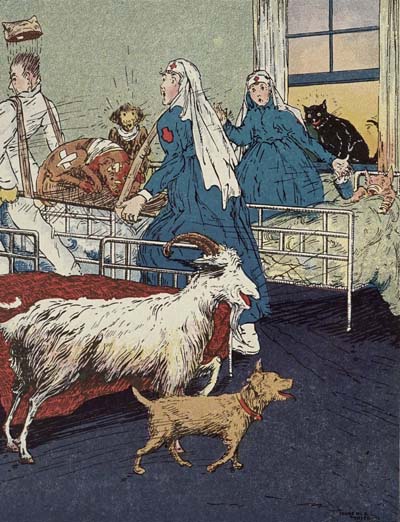
Billy gave one long, loud baa that resounded down the big,
bare room.
(Page 49)
[67]“‘So-ho! You would sell me for chops and roasts, would you? Well, just you come a little nearer and see what happens to one little Chinaman!’
“The Chinaman with the clothes began to hang them on the line, singing a queer, monotonous refrain in his cackling language. By this time the first Chinaman was within three feet of me, holding the carrot straight out before him and staring into my eyes. Evidently he was not used to goats, and felt a little uncertain as to what I would do. While I was watching him, expecting he would try to throw the rope over my head every minute, to surprise him I stretched my neck out quickly, grabbed the carrot out of his hand and ate it up. Then he came boldly up to me, as this gave him the assurance I was not going to butt him. But when he tried to put the rope around my neck, I simply lowered my head and butted him over flat on his back. This infuriated him, and he leaped up and grabbed a clothes pole to hit me with it. Then the chase began. Around and around that small back yard we went, upsetting everything, he trying to hit me all the while and I dodging him but trying to butt or hook him at every turn. Then I took to butting everything and anything that came in my way. One thing I butted was the basket full of clothes the second Chinaman had left, having sought[68] a place of safety when first the chase began. Now he sat cross-legged on the low roof of the back porch grinning from ear to ear and watching the sport. When I butted the basket, it shot straight up in the air, spilling out the clothes as it soared, which the wind caught and carried over into the other yards.
“Presently from all the doors and windows of the adjacent buildings one could see grinning faces. But not one person came to help that Chinaman I was butting and chasing. He must have been thoroughly disliked by his neighbors for them to act as they did. Their jeers and calls made him madder and madder and every time he tried to hit me with the long pole and missed, they would call:
“‘Try it again! Try it again! Don’t give up!’
“Once the pole just grazed my back, and for this I went to the clothesline and taking a shirt sleeve in my teeth I jerked it off the line, stamped on it and then tore it to pieces. He nearly foamed at the mouth when he saw this. And I was just walking up to get another when some one slipped up behind me and threw a blanket over my head. Well, of all the rolling and tumbling that went on then you never saw the like! First I was on top, then the two Chinamen were. My legs were loose and you better believe I used them. I kicked and kicked. Then all of a sudden it seemed as if every Chinaman in all Chinatown was sitting on top of me.[69] They came from over the fences, from all directions, and every one that came proceeded to sit on me. At last there were so many of them I could not move. They tied all four of my feet together and strung me on a pole, which they suspended over a place where a bonfire had been made over which to make soap. Some one removed the big kettle of soap and then they put me right where the kettle had been. Next they took the blanket off my head and began dancing around me, and spit at me and jabbed me with sticks, doing everything they could possibly think of to torture me.
“The blood ran into my head so from being hung upside down that I could scarcely see, and the ropes binding my feet cut into me until I bled. But still these heathen Chinese showed no mercy and I was beginning to wonder if they intended leaving me to die a slow death when the first Chinaman said, ‘Let’s build a fire under him and cook him alive! Roast goatee is velly, velly good, me hear.’
“This seemed to please the crowd, and they joined hands and ran around and around me, chanting some heathen song until the old Chinaman who had proposed cooking me alive came with some matches and shavings to start the fire.
“Then for the first time I began to be worried, and thought, ‘Well, at last I am in a tight place I can’t get out of,’ when I heard howls of pain and rage and the fierce growl of a dog. Opening my eyes to see what was taking place, I saw Stubby biting the[70] heels of the Chinaman as he stooped to light the fire, while Button sat on his back scratching the very shirt off him. In about two minutes the yard was cleared of Chinamen, I can tell you! Stubby bit and Button clawed them until they were glad enough to climb the fences to get away alive.
“They had frightened the Chinamen off and saved me from being roasted to death. But how were they ever to get me off that pole?
“At last I thought, ‘Perhaps if I wriggle and squirm my weight will break the pole. Anyway, I am going to try it.’
“And soon I found that by moving my body in a certain way I could start a certain motion that made me swing up and down and the more I moved the higher I went and the pole began to creak. Then presently it broke in two and came down all in a heap. I had scarcely touched the ground when Stubby and Button began to gnaw the ropes that bound me, and in a jiffy they had gnawed them through and I was loose.
“Do you think I ran away when I was free once more? No, indeed, I did not! I stayed right there to get even with Mr. Chinaman who had proposed to cook me alive. It was very dark in the yard now as night had closed in while all the fuss was going on. So I proposed to hide and wait for the Chinaman to show himself in the yard. Well, all I can say is that if he ever did show himself I had made up my mind to kill him. Stubby and Button hid too,[71] and then we waited. And as we waited the earth under our feet began to quiver and shake and low, rumbling noises were heard like distant thunder. These shakings and tremblings of the earth continued growing more and more violent until they threw me off my feet once or twice, while the ripping, roaring noises grew louder and more frequent. Presently fire bells began to ring and the night sky was illuminated with vivid red reflections from huge fires. But still we three watched for those Chinamen to come out of the house.
“‘Come on, Billy!’ Stubby barked in a whisper. ‘Let us get out of here. We must be having one of those terrible earthquakes they sometimes have out here in this country.’
“‘Yes, come, Billy,’ urged Button, ‘and leave the Chinaman to the mercy of the ’quake. Perhaps the earth will open and swallow him!’
“‘Hope it does, but I am going to give him a butt that will break his back first. I’ll teach him not to torture goats in the future!’
“‘S-s-s-s-h-h-h!’ exclaimed Button. ‘I see him through the window. He is coming now.’
“Cautiously the door opened a crack, and the Chinaman’s crafty face peered out. His eyes searched every nook and corner of the yard, but he saw no goat, dog or cat. Button was so black one could not see him as he sat on top of the fence. Stubby was hidden under a pile of old chairs, tables and so on, while I was close against the[72] house behind the door the Chinaman had just opened. I got there on purpose so that when once he stepped into the yard he could not go back unless he passed me for I would be between the man and the house.
“‘What has he in his hand that smokes so?’ I wondered. ‘Why, it is a dipper of boiling water! Gee, I bet he intended to throw that on me when he saw me. Well, I’ll just sneak up behind him and give him a butt in the back and make him spill it on himself and then he can see how he would like boiling water thrown on him.’
“I did not dare to try to walk up behind him for fear I might stumble over something and then he would hear me and throw the water, so I made one big jump from behind the door and butted him squarely in the back. Well, I made the jump all right, but just as my feet left the earth it opened under me with a ripping, tearing noise and swallowed the Chinaman with his dipper of hot water, and closed again so quickly that when I came down from my jump I lit on solid ground where but half a second before had been a yawning chasm. Whoo! That was a narrow escape, for had I stood still the earth would have opened under me or if I had not happened to jump high enough I would have landed right in the opening and been crushed or killed as had the Chinaman.
“The ’quake that swallowed the Chinaman had extended far and[73] shaken down lots of the old rickety buildings in the neighborhood, and buildings were tottering and falling all around. So Stubby, Button and I lost no time in getting out of that place, I can tell you. I simply butted down the door the Chinaman had bolted when I came in, and we all three ran out and down the street towards the Bay. I won’t stop to tell you of the destruction of the beautiful city and the fearful, gruesome sights and sounds we saw and heard, or how the flames licked up the handsome buildings after the earthquake had shaken them down, for the destruction of San Francisco has passed into history and any one of you who wish to hear more of it can listen as some one is reading aloud about it. This ends the tale of one of my most thrilling adventures.”
“Oh, thank you! Thank you so much, Mr. Whiskers, for telling us this story,” exclaimed the facile Pinky. “I have enjoyed hearing it so much, though you did make my skin creep and my hair stand on end when you were telling of how they proposed to cook you alive.”
Then all the other dogs thanked him also for relating to them this wonderful tale.
“I think we better go back to the hospital and look for Button and see if we cannot find a way for me to slip in and see Stubby,” remarked Billy.
[74]

WHILE Billy had been relating his adventures Button had been lying in a box under Stubby’s window, trying to think of a way to get to him and tell him that Billy was here in this very place.
“If there was only a fire escape!” he sighed. “Then I could easily make it.”
It was getting near supper time but he was still puzzling his brain over the matter when he saw one of the nurses in Stubby’s room come to the window and let down a rope with a basket on it. When it reached the ground she still stood there holding on to the rope as if waiting for some one to come.
“What in the world can be going on now, I wonder,” mused Button.
Presently from around the corner of the hospital from the kitchen he saw another nurse appear with a tray loaded down with the dogs’ supper. There not being an elevator in this old building, the nurses had thought out this way of saving them climbing the long flight of steps with the heavy trays on which they carried the dogs’ food to them. One nurse would go to the kitchen, get the food prepared[76] by the cook, and then bring it around to this window, place it in the basket, and the nurse in the window would pull it up. When the dogs had finished their meal, the dishes were lowered in the basket just as they had been hauled up, carried back to the kitchen and washed. So you see what a saving of steps this basket elevator really was.
“My, if I could only manage to get in that basket and have her pull me up!” thought Button.
The cat watched the nurses raise and lower the basket until presently a nurse came from the kitchen, put the food in the basket and went off, forgetting to pull a string which rang a bell, the signal that the basket was ready to be pulled up.
“Gee, she has forgotten to pull the string and gone off. I can see the nurse in the window waiting for the signal. She will get tired waiting pretty soon and pull it up, I believe. I am going over and eat up what is in that basket and hop in myself, and then I shall be pulled up. If the basket feels heavy, the nurse will think there must be an extra amount of dishes in this trip.”
Suiting the action to the thought, Button hurried over to it, lapped up a cup of milk, ate some cold chicken and potatoes, and then he saw the basket begin to move. Without a moment’s hesitation he jumped in and sat on the soiled dishes and the remaining suppers. Up, up he was slowly drawn, and he heard the nurse mumble to[77] herself, “Wonder what they have in this basket to-night? It feels like a basket of bricks, it is so heavy.”
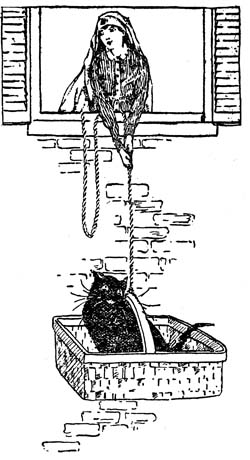
“Now if she only doesn’t see me until the basket is safely on the window ledge I shall be lucky. I am afraid if she sees me, it will frighten her and she will let go the basket and down I will fall with a dull thud.”
But just as the basket reached the ledge of the window her attention was called to something inside and she turned her head to look, at the same time reaching her hand out and pulling the basket on to the window sill from force of habit. When she turned back to the window, there on the sill sat a black cat with big, yellow eyes looking at her. It startled her so she screamed and pulled the basket in off the sill, and then let go the handle, and it rolled under the bed of one of the patients, spilling out bottles of milk, biscuits, sliced chicken, and many other good things.
[78]Taking advantage of the confusion, Button jumped down from the window and ran under the beds until he came to the one occupied by Stubby. Then he moved softly so as not to frighten Stubby, and crawled in bed under the sheets so no one could see him. No one did see him do it for every dog in the ward was sitting up in bed, straining their eyes to see what had happened by the window.
“The cat! The cat! Where did it go?” the nurse kept calling in an excited voice. For when she turned to look for him, the cat she had seen was gone. After all the nurses had looked under every bed and in all the corners and in every other conceivable place, they began to tease her and tell her it was an illusion, that she had only imagined she saw a cat. After awhile she began to think that perhaps this was the case. Still what would make her think she saw a cat when she did not? Especially as she had not even been thinking of cats? The only thing that looked as if she had seen one was that half the dogs’ suppers had been eaten or at least they were short some food. That nurse went to bed that night with a headache from trying to decide whether or not she had seen a cat.
Soon after supper the dogs in the hospital were given their last dose of medicine, their bandages were straightened, and then they were ready to be tucked in for the night. The nurses patted the dogs on their heads and said good-night to them just as if they were people. Then they turned down the lights and went out, leaving[79] only the night nurse in charge in one corner of the room where she sat by a shaded light knitting for the soldiers and dreaming and praying for the safe return of her brothers and sweetheart after the war was over. Button did not stir until Stubby stuck his head under the sheet and whispered to him that he could talk now, as the nurse was so occupied in picking up some stitches in her knitting that she had dropped that she would not hear them.
So there the two lay all curled up under the sheet, Button telling of the finding of Billy and Stubby listening with all his ears. When Button had finished, Stubby gave a great sigh and said, “Isn’t it wonderful to think that we should have found him in this big, big country across the sea? My, I am so glad it will make me well soon. For life was not half worth living without our dear chum Billy. I know you agree with me, Button.”
“I surely do!” exclaimed Button. “How is your leg, old fellow? Healing fast, I hope.”
“Oh, yes. The nurse said they would take the splints off to-morrow, and she doesn’t think I am going to be lame, it was healed so straight and fine. Isn’t that grand? For I would hate to be bothered limping along on a lame leg on our trips. It would be very inconvenient when I wished to run away when some one was chasing us, too. I hate to hurry you off, Button, but the night nurse will be coming around soon to straighten our beds and give us our[80] last drink for the night so I am afraid she might lift up the sheet and find you. But how are you going to get out of the door into the hall, as it is shut?”
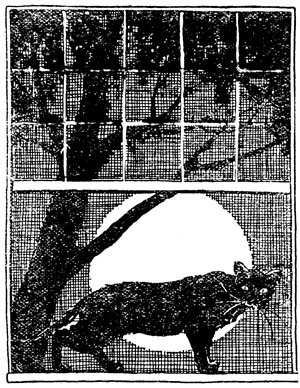
“Trust me! I will get out as I came—by the window.”
“I did not know there was a fire escape by the window,” said Stubby.
“There isn’t. I came up on the food basket.” And then Button told him how he had come up in the basket and nearly scared a nurse to death.
“But you can’t go down that way because there is no one here to let the basket down,” objected Stubby.
“I don’t need any basket to go down in. All I need is the rope, and as it is fastened to the wall I will just have to slide down it.”
“Oh, Button, but you are a smart cat! You should have been born a man, not a cat. If you had, the world would have heard of wonderful things you had done, I am sure.”
“If you wish I had been born a man, I wish the three of us had. Wouldn’t Billy have made a splendid brigadier general, while you would have made a dandy lieutenant!”
“S-s-s-s-sh-h-h! I hear the nurse coming. Scoot! Drop out of bed on the side nearest the wall and run under the beds until you are near the window,” advised Stubby.
[81]The nurse was walking down the aisle of the ward that faced the window when the moon came out from under a cloud and shone straight into the room. And she saw not only the moon, but a big black cat as it jumped up on the window sill. She shut her eyes, looked again and again, and the cat had disappeared!
“It must be the same cat that Nurse Mollie saw, and now it has disappeared again as completely as it did when she saw it. She got one glimpse and it was gone. I got another, and it faded in thin air. Heavens! We must be going to be bombarded for black cats bring bad luck, they say, and this cat has come to warn us. I’ll just run to the window and see if I can’t see it. It could not jump out of the window because it is too high from the ground, and it isn’t in this room, and cats can’t fly, so where is it?”
The nurse went to the window and looked out. No tree, roof or shed was near enough for the cat to have jumped to them and[82] then to the ground, so of course it must have been a spook cat for no cat was in sight. She never looked close to the building, or she would have seen a rope to which clung a black cat, hanging on desperately as it lowered itself to the ground.

WHILE Button was hanging on to the rope Billy and the dogs came around the hospital to look for him.
“There! I told you Button was the smartest cat you ever heard of, and I bet he would find a way to see Stubby. There he comes now, down that rope from Stubby’s window!” said Billy.
When nearly to the ground Button jumped from the rope and landed at Billy’s feet.
“Hello, Billy and friends! How do you find yourselves? I have just been up to pay Stub a visit, and I accidentally frightened two nurses nearly to death and made them both believe they saw a spook cat instead of a live one.”
“But how am I to see Stubby? That is what I want to know,” asked Billy.
“I am afraid you can’t get into the hospital to see him, Billy. But you will probably have a fine chance to see him to-morrow. I heard the nurse say she was going to take all the convalescent[84] patients out under a tree in the yard if it was a nice day. And as the sun set clear, I think you will have a chance to talk to him to-morrow. If you cannot get near enough to him to chat, at least you can see him.”
“How is his leg getting along?”
“Oh, splendidly! He will be able to use it in a few days. They are taking off the splints to-morrow.”
“That is good news indeed. Now it will be only a short time before we can start once again on our journey home.”
“Our journey home!” exclaimed Button. “Who said Stubby and I were going with you?”
“I did. Or rather I planned taking you both along with me. You don’t suppose I am going without you now I have found you again, do you? Not by a long way!”
“But what if we refuse to go? You can’t carry us, one on each horn, can you?”
“Yes, I could, but I don’t want you to go that way, or against your will. I want you to want to go. And I know perfectly well that I can offer enough inducements to coax you both to go with me.”
“But how about deserting our regiments?”
“You have already deserted yours in following Stubby here,” answered Billy.
[85]“But I had to follow a wounded friend! Besides, they would be delighted to see me back.”
“That is all well enough! But you fellows are coming back home with me just as soon as Stubby is able to travel. And I will tell you why. In the first place you both have had about enough of war to last you all your lives. Again the war will soon be over now the United States army is in the thick of the fight. And again you both have come to the conclusion that there is no country you would care to live in but America, and the United States of America part of it at that.”
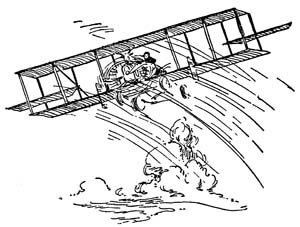
“You are right, Billy. I was only teasing you to hear what arguments you would put up. But none of them are the real reason why we would leave the army now and go home. The only thing that would induce us to leave it before the war is over is the same thing that made us join it.”
“And pray may I ask what that is?”
“Yes. It is yourself. We left home to find you. Having found[86] you, we are ready to leave everything and follow you whether you go home or away from home.”
“Bravo! Bravo!” cheered the dogs. “You and Stubby surely are bully friends for a goat to have. We congratulate you, Billy, on having such true and loyal ones.”
“Thanks,” bowed Billy. “Do you know the way to make and keep true, sincere and loyal friends? I’ll tell you. Be one yourself.”
“Hurrah for you, Billy! You will always have the last word.”
“Do you mind telling me a part of your immediate plan and how you propose getting from here to where we are to embark? Or are you thinking of stealing a ride home in an airship?” asked Button.
At this the dogs laughed. The idea of a goat, dog and cat riding in an airship!
“Well, my friends, you need not laugh and think that is impossible, for I already have crossed the American continent from New York City to San Francisco in an airship,” said Billy.
“Will you tell us what you haven’t done, Mr. Billy Whiskers?” asked Pinky.
“I could not; it would take too long. Well, in the first place,” he continued, turning to Button, “I thought unless a better plan offered, I would go straight to Paris and from Paris to the seacoast and get on the first boat sailing for America. I had not decided on[87] any special port to sail from. I just left that to chance, for probably we would have to try many before I could sneak on board. But the hardest part of the trip will be from here to Paris, as we are known by the soldiers around here, and we run the risk of being carried back to the army any minute. If we leave the main highway that leads to Paris, I am afraid we may lose our way and go a long, roundabout route and possibly we might fall into the hands of the Germans.”
“Billy, I’ll tell you what I will do,” spoke up the Red Cross dog. “I’ll leave going back to the army long enough to show you the way to Paris and across that city. You could easily find your way to Paris, but I doubt if you could find your way out. It is a big city, and the roads out are all well guarded now by soldiers who might recognize you, capture you and send you back. I know every step of the way, and we could slip out at night or swim the river Seine where it runs out of the city. After I had accompanied you to within sight of the sea I could come back. I need a vacation and the trip would be one for me.”
“Thank you, my dear Duke,” for that was the name of the Red Cross dog. “I will accept your offer. But I cannot allow you to carry out one part of it, and that part is to leave us and go back into the army. They have plenty of Red Cross dogs and police dogs,[88] too, so they can spare you now. As you have expressed a desire to see America many times, why not continue on with us and visit our fair land?”
“Just the thing!” exclaimed Button. “You may never have such another chance to visit our country in such good company as a goat, dog and cat of world renown—a-hem, a-hem!”
At this they all laughed and Pinky said, “Why, yes; why don’t you go, Duke? I only wish I had the chance.”
“Well, you have!” said Billy. “I extend my invitation to all here.”
“Oh dear! Oh dear! Much as I should love to go, I dislike the hardships of travel too much, and I know I should be seasick. I was when I crossed the Channel once to go with my mistress to visit some friends in London. But I should dearly love to go as far as Paris with you and see the surprised face of my mistress when I came trotting in. You know she sent me here so I would be safe when they began to bombard Paris with those extra long range guns. Besides, she said she had so much Red Cross war work to do that she could not take the time to look after me properly and see that I had my walk in the Boulevard or in the Park every day. And it would be unkind of me to run away to America and leave her when she has been so kind to me.”
“I must go back to my mountains,” said the big St. Bernard, “as[89] soon as I am able and help find the travelers that get lost in the heights and would die of starvation if it was not for me.”
So none of them accepted Billy’s invitation to go except Pinky and even she was going only as far as Paris.
“Listen! I thought I heard the sound of an automobile turning into the lane,” said Button.
“You did,” said the hound. “I just saw the flash of its lamps through the trees.”
Billy and the dogs talked for a while longer, and they were about to say good-night when they heard voices coming in their direction.
“S-s-s-sh-h-h!” said Billy. “I thought I recognized that voice! It is the old General’s chauffeur. Now what can he be wanting here at this time of the evening? I’ll just listen and find out. No, I will get Button to creep up close and listen for his black coat won’t show in the dark like my white one would.”
Button crept through the long grass until he was right near where the chauffeur and the cook stood talking. There being a tree near them, Button ran up it and sat on a limb listening to every word they spoke.
“Well, Jean,” said the cook, “what important business have you on your mind this evening, or have you come to take away some of our convalescent patients?”
[90]“My business is most important, and I have come straight from the General.”
“Hoity-toity! You don’t say so! Whatever can it be about?”
“That blasted old Billy goat that the General sets such stores by.”
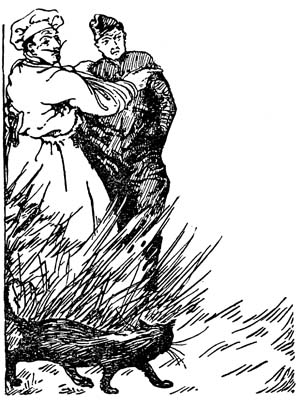
“You don’t mean it!” said the cook. “And why are you looking for him here when you took him away with you only two days ago? You don’t mean to tell me that the slippery old rascal has escaped from camp again?”
“No; he did not escape from camp, because we never succeeded in getting him within miles of it. We hadn’t gotten ten miles from here when we broke down and that pesky old goat escaped.”
“Oh, you are fooling! He could not escape one General, three officers and a smart chauffeur like you!”
“Oh, couldn’t he? You don’t know that old goat if you think that. He could escape a whole regiment if he wanted to.”
“And why do you come looking for him here?”
[91]“Because we found him here and as he seemed to be having a pretty good time with the dogs, we thought he might come back.”
“Oh, you did, did you? Well, you reasoned well, for he did come back, and I tried to catch him so I could claim the thousand dollars reward. You see my right arm is in a sling, don’t you? Well, it is all on account of trying to capture that same old goat.”
“You don’t mean to tell me that he really is here? Divide the thousand dollars with me and I will help you catch him again.”
“Never again do I monkey with that goat! I once swore I would not, and nothing would induce me to try it again. Would you like to know what he did to me and how I broke my arm?”
“Yes, I would.”
“Well, it happened in this way. He did come back and I thought I would catch him and claim the reward. One might as well try to catch the devil asleep as to try to catch that goat off his guard. Do you see those steps that lead up onto the hospital porch? And that cherry tree down the lane the other side of those beehives? Well, just imagine me, fat as I am, at the end of a rope, being jerked off the porch where there are no steps, pulled around the yard, down past the beehives, upsetting them, chased and stung by the bees, wrapped around that cherry tree so tight I could not move and then the rope pulled out of my hands so fast it blistered them while the goat ran on, stopped to look around, saw me stuck to the tree, and[92] then he gave a baa, swished his tail and disappeared. I have not seen him since. I hope the bees stung him so he will remember the day as long as he lives, for I know I shall. Why, I could not see out of my eyes for two days, they were swollen so, and my ears looked like a jackass’s, they were so swollen out of shape. No, thank you! You may have all the honor of catching that goat yourself, and the reward that goes with it. I’ll be a goat catcher no more.”
Button could see in his imagination just what Billy did to the fellow, and he laughed so to himself that he nearly fell out of the tree.
“If you would like to hear it, I will tell you how he escaped the five of us,” offered the chauffeur. Then he told the cook what you already know, the recital of which pleased the cook immensely, as misery likes company, and he was glad to know that he was not the only one Billy had gotten the best of.
“I tell you what let’s do,” suggested the chauffeur. “There are two of us against one goat. We will lay a plan and get him. Then we can divide that thousand dollars between us. We won’t try to get him in a hurry, but we will lay a plan that can’t fail.”
“Can’t fail?” laughed the cook. “Any plan would fail with that old goat unless you killed him outright. And we don’t want to do that for the General’s reward is for him alive, not dead.”
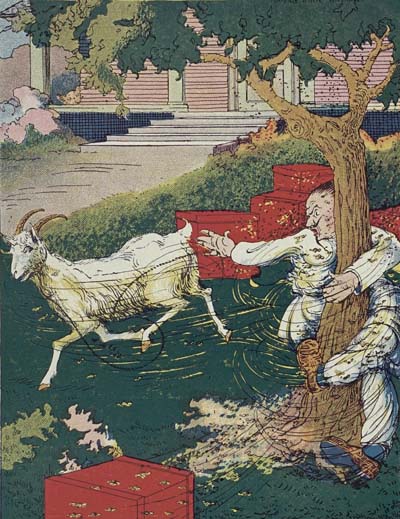
Away went Billy, jerking the cook around trees,
over stumps and beehives.
(Page 56)
“Well, it is a pity with such a big reward in sight if we can’t get[93] ahead of one old goat! I’ll eat my shirt if I don’t capture him alive within three days after I lay eyes on him.”
“You’ll eat your shirt then, young man, and I will sit by and see you do it if he doesn’t bung up both my eyes so I can’t see out of them before then.”
“Now let’s plan how I shall go about it,” said the chauffeur.
Button waited to hear no more, but ran to tell Billy that they were laying plans to capture him.
[94]

WHEN Button got back where he had left Billy and the dogs, he found them all gone.
“I guess Billy thought they better hide somewhere until I came back. I can soon find them, however, by running up a tall tree and looking over the place, for even in this twilight I can see Billy’s white coat. Yes, there is a white object about his size moving toward the woods. I will follow it and I bet it will turn out to be Billy. It is too big for a dog, and too small for a cow.” So Button ran after the white object and soon came up to Billy and the dogs.
“There, didn’t I tell you dogs he would find us?” said Billy. “Button, our friends here did not want to leave until you came back. They were afraid you could not find us, and that you would feel hurt at our going off when you had gone to get information for me. They do not know us, do they? That we always understand one another and know that every move we make is for the best and our safety. Well, what did you find out?”
“That the two are at this very minute plotting to capture you[96] so they can get the reward offered by the General,” and Button began to laugh.
“What are you laughing at? Tell us,” said Pinky.
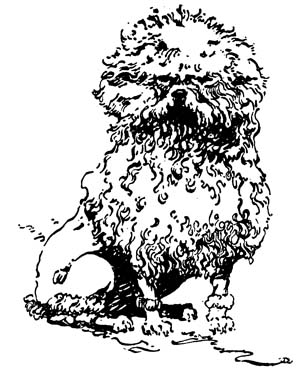
“It is at what those two said. They have you down fine, Billy, and think you are a foxy old rascal with brains. So the two are going to lay a deep plot and are not going at it hastily so as to be sure to catch you. The chauffeur has promised to eat his shirt if he can’t catch you in three days.”
“They better lay a deep, dark plot and keep it under their hats if they intend to catch me within three days, for I am leaving in about fifteen minutes,” answered Billy.
“Oh, Mr. Whiskers, you don’t mean that! You surely don’t mean to leave us so soon. Besides, if I am to go with you to Paris, I can’t possibly get ready in that time. Why, I have all the chickens, ducks, pigs and the other fowls and animals on the place to say good-by to, let alone all my friends in the hospital!”
“Then you can’t travel with me, Miss Rosie de la France, as we three never know ten minutes ahead where we will be next, or what our next move will be. My being alive now is all due to my being[97] able to think and act quickly. And I must leave here before those two plotting my capture set eyes on me again. Now here are my plans. I made them while walking over here. I will go ahead to the outskirts of the next town. There I will wait for Stubby, Button, Duke and yourself, if you still feel like risking your life with us, and taking all the hardships that come along without a whimper or complaint. For it is our motto never to complain or cry over spilt milk. What is done is past and gone; why spoil the present and becloud the future by dwelling on it?”
“Thank you, Mr. Whiskers, but I think probably I better stay here until my mistress comes for me. My surprising her might turn out not to be pleasant after all.”
“I think you are wise in your decision, for these are troublous times to be running around loose without a particular friend, and I think you are not enough accustomed to hard knocks to travel with three such hardened travelers as we are.”
“I am glad that sniffly-nosed, red-eyed little poodle is not going with us,” mused Button to himself. “I never could abide poodles, anyway, and this one seems to be a sentimental fuss-and-feathers kind of one.”
“Time’s up, boys! Glad to have met you all, and hope if any of you ever come to America that I shall have the good luck to run into you and the chance of returning some of the hospitality you[98] have extended to me as well as that I may show you some of our beautiful country. Remember, Button, as soon as Stubby is able to travel to meet me on the outskirts of the next town. Good-by, good-by, kind friends!” and Billy was off.
He had scarcely disappeared in the darkness when the dogs heard the chauffeur and the cook coming toward the woods. They were sneaking along, looking carefully under every bush and behind every pile of stones for Billy.
“I tell you,” said the cook, “I saw him running in this direction after we had the mix-up with the bees.”
“Skedaddle, all of you!” mewed Button. “Don’t let them find us all together.”
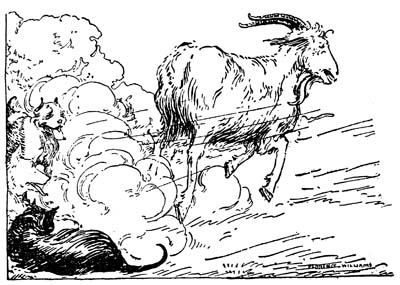
“How long ago did you see him coming in this direction?” asked the chauffeur.
“Oh, about three hours.”
“Three hours! Oh, the dickens! In that time he might[99] be half way to Paris. I thought you had seen him just before I came.”
“Well, he is somewhere around here, I bet.”
“If he is, he is probably laughing inside himself at the spectacle we make creeping along in the dark looking for him.”
Button went right back to the hospital and climbed up the rope that was still hanging from the window of Stubby’s ward. He thought he better go tell Stubby the latest plans while the rope was still there. He had very good luck indeed, and succeeded in getting to Stubby without being seen and in telling him what he had heard the men say and of Billy’s plans for them to join him as soon as he, Stubby, was able to use his leg.
“Isn’t it too provoking that I have to be laid up with a broken leg? Why couldn’t it have been my tail or an ear that got hurt? Then I could have traveled.”
“Never mind, old fellow! You will be all right in a day or two. In the meantime Billy can amuse himself by getting in more mischief, and I can pass the time by trying not to get into any here. I think I better vamoose now or some one will be coming and find me as I see it is about time they change the night shifts. I’ll see you in the garden to-morrow. Good-night and pleasant slumbers free from pain!”
Just as Button was on the window sill about to jump for the rope,[100] the second night nurse who was to relieve the one now on duty came in the room, and it happened to be the one who had seen Button first and had been trying to argue herself into believing that she had not seen a big, black cat sitting on the window sill in the moonlight. On seeing the same cat again in the same place, she screamed and threw up her hands to cover her eyes. Her cry startled Button so that he nearly lost his hold of the rope, for he was just sticking his claws into it preparatory to climbing down when the nurse opened the door.
When she took her hands from her eyes to look once more and be sure that the cat was still there, the cat had disappeared, just as it had done before.
“There is something horrible going to happen to the hospital, I know,” she said to the other nurse, “for that is twice I have seen the vision of a big black cat.”
“And I too. I also saw it this evening, just where you did, when I first came in to take your place. I do hope it is not the forerunner of a German raid or that the Germans are going to drop bombs on us.”
It amused Button greatly to see how superstitious the nurses were about a black cat.
“I wonder how I shall pass the time until Stubby is taken out into the yard to-morrow,” he thought. “I think I will go over to the[101] haymow and catch a mouse and see if French mice taste like American ones.”
He had crawled through a hole in the side of the barn and was quietly making his way toward where he thought the haymow would most likely be when he heard whispering voices. He stopped to listen and made out that they were speaking in German, not in French. And he immediately thought, “Spies, or escaped prisoners!”
“I’ll just listen and hear what they have to say,” he decided, “but I’ll try to get a little closer.”
Being black as a coal, he could not be seen easily unless the light struck his eyes. So he crept cautiously toward where the sound of the voices came from, and found it was in the haymow above his head. It took but a minute for Button to climb the ladder that led up to the mow, but as he stepped from the ladder onto the hay, it gave way and he fell into a hole in the hay made by one of the men’s legs when he had stepped off the ladder.
“What was that noise I heard?” said one of the two voices in a frightened tone.
“S-s-sh-h-h-h! Keep still and listen!” commanded the other.
“I hope it is not that French colonel who has been on our track for days,” answered the other.
Button never moved, and in fact he held his breath until the men began talking again.
[102]“It was probably a rat you heard in the hay,” said the man who had spoken last. “Don’t you think it is about dark enough for us to get to our work and blow up this Red Cross hospital, so we can get back to our line before daylight?”
“So-ho!” thought Button. “You two think because this hospital has a big red cross on a white ground painted on its roof that it is a regular hospital for wounded soldiers instead of just one for dogs. And you have been sent to blow it up! Well, I’ll fix you! I’ll scratch your eyes out so you can’t see to blow it up.”
Then and there Button began to act as if he had a fit. He flew out of the hole he had been hiding in and right for the men, whom he could see plainly with his cat eyes in the dark mow. Before they knew what was happening, he ran up one’s back, reached around his neck as he sat on his shoulder and scratched both his eyes out.
“How do you like the feeling? That is for scratching out the eyes of little Belgian children!”
The man cried out from pain, but what cared Button? He jumped from this fellow’s shoulders straight into the other’s face and out went his eyes.
“Now you two can sit here and repent of your sins and think how the little children suffered whose eyes you dug out! And the Germans are planning to blow up this hospital, are they? Such being the case, I must get Stubby away from here at the earliest possible[103] moment. I know what I can do. I can carry him on my back, he is such a little fellow, and he is so thin now that I can easily do it. Then when we reach Billy, he can carry him and in this way, by taking turns, we can get him far away from here before the Germans raid the hospital.”
And this is just what Button did. The very next day when Stubby’s nurse carried him out of the hospital and placed him on a cushion under a tree, with the splints off his leg, Button came along and told him what he had done the night before and that he feared the Germans would blow up or set fire to the hospital that very night. By first coaxing, then scolding, he at last persuaded Stubby to consent to ride on his back and let him take him where Billy was waiting for them on the outskirts of the town seven miles away. They bade all the dogs good-by and the Red Cross dog insisted that as he was larger and stronger than Button he should carry Stubby on his back part of the journey. “Besides,” he said, “I have a cloth bandage around my body with the Red Cross sewed on the front. Now this bandage will be an excellent thing for Stubby to stick his claws in to help him hold on. It will be much easier trying to do that than trying to stick them into your short hair, more especially as he has only three legs he can use.”
And thus they started on their journey, keeping close to the road, but going just inside the fields and orchards that bordered either[104] side of the highway. They made very good progress, and the Red Cross dog did not feel the weight of Stubby at all. They rested a little after noon, and Button and the Red Cross dog left Stubby behind a straw stack in a barnyard while they sneaked up to the house to see if they could not find something to eat and to carry back to Stubby.
“Bow wow!” barked a big dog, jumping out at them from his kennel. “Who are you that comes prowling around here? Oh, I beg your pardon! I did not notice you wore the badge of a Red Cross dog or I should not have barked, for all Red Cross dogs are welcome in this place and the farmer and his family will do all they can for you. Just go up to the house and when they see you wear a Red Cross badge they will give you a hot supper and a soft bed to sleep on if you care to stay over night. I would go up to the house with you, but, as you see, I am chained. They will bring some dinner to me and I will share it with your friend here, the black cat.”
“I am sure that is very kind of you,” replied Duke, the Red Cross dog. “Since you say the family here is kind to Red Cross dogs, I will walk boldly up to the house.”
“You will find them all I say they are, for my master used to train dogs to be police dogs, and he sold them to the police in Paris. Then when the war began he trained them for Red Cross work. But all[105] his dogs are sold now or gone to war. He was such a good trainer that he got very high prices for his dogs. I should not wonder but that you may have met some of the dogs trained by him if you have been at the front lately, as many of them are in active service there now.”
“Your master’s name could not possibly be Jean Baptiste Frère, could it?”
“That is just what it is!”
“Well, well, well! I declare! That is too queer! My chum was trained by him and lots of the dogs I know. My chum’s name is Sharp Ears, or rather that is what the Red Cross people call him, for he seems to be able to hear things long before any one else can detect the slightest noise. For that reason he is kept on police duty with the sentinels that have to tramp up and down, up and down in the deep woods on guard all night. He will hear or scent an enemy long before he comes in sight, and he always gives warning by pricking up his ears and looking straight into the sentry’s face, but he never barks to betray the sentry to the enemy. Then he turns his face in the direction from which the sound comes. If it is one of our soldiers, he will keep perfectly still. If it is a German, Austrian or any of the enemy soldiers, he will give a scarcely audible growl. He has saved many a sentry’s life by warning him in this way that some one was coming.”
[106]“How can he tell whether it is an enemy or a friend coming when he can’t see them?”
“I asked him that very question, and he said he can always tell a German by the scent as they smell like pigs, and that he had never made a mistake yet.”
“I did not know before that the German soldiers have an odor peculiarly their own.”
“Nor I until he told me! Here they come with my dinner now, and as they don’t like cats very well, I think your friend better hide in my dog house. I will stand before the door so they can’t see inside.”
“Hello, Towser!” called out the farmer when he saw Duke. “I see you have company and most distinguished company at that. Come here and let me see by your badge to what regiment you belong.”
Duke went up to the farmer who had a very strong but kindly face and allowed him to read what was engraved on the tag that dangled from his collar.
“Why, bless my soul! You are from the same regiment that my son is in and also the one that owns my best trained dog. Oh, if you could only talk and tell me how they are faring out on that battlefront!” And he gave a deep sigh. So did Duke for he too wished he could talk and tell the farmer of some of the noble, brave[107] deeds his son had performed and also some of the clever, smart things his dog had done.
“Come with me up to the house and I will give you a dinner that will make your sides stick out and ready to split,” which he certainly did. Duke ate and ate and still he could not see the bottom of his plate. There was fried chicken, with mashed potatoes and gravy fit for a king to eat. He ate all he possibly could for he knew it would be a long time before he ever was offered such a dinner again. But all the time he ate he kept thinking of how Stubby would enjoy the big chicken leg he was going to carry to him in his mouth when the farmer left him and he could slip away. He was just wondering how he was going to get away from the farmer when some one in the house called him to say that he was wanted on the telephone.
He had not disappeared inside the door when Duke picked up the chicken leg and ran with it to Stubby, and as he rounded the stack from one side Button did from the other with a second drumstick in his mouth. So you see Stubby fared pretty well.
“Those people seem to be very kind,” said Stubby, “and I guess it will be a good while before we meet any one their equal again.”
[108]

STUBBY was nibbling on his chicken leg with Duke and Button nearly half asleep when they were all startled by the farmer coming round the straw stack unexpectedly. But if they were surprised, the farmer was more so. To come unexpectedly upon two stray dogs and a black cat and one of those dogs the Red Cross dog he had just been feeding was enough to surprise any one.
“Well, well, well! Where did you all come from, I should like to know? And if here isn’t another Red Cross dog! But no, I am mistaken. You are a cat, but a cat with a regimental tag around your neck. Come here, little dog, and let me read what your tag says,” but when Stubby got up and tried to limp to him, the farmer saw that his leg was hurt, so he went to him and taking him in his arms, he felt of the injured leg and found it had been broken. As he had set many broken legs for dogs, he knew what to do for Stubby and he said, “You two follow me. I am going to take this little dog to my office and rub his leg with some strengthening liniment I have which will make it heal quicker. And I am also[110] going to give him a tonic to brace him up for I see he is very thin and weak.”
Stubby licked the farmer’s hand to show how he appreciated all this kindness.
When they reached the office, the farmer put his glasses on and read the tags on all their necks, and when he got through he called to his wife to come quickly, that he had made a wonderful discovery. “Just you read that, wife,” he said, after he had read Stubby’s tag once again. “This cat and dog are the long lost and much advertised mascots of two American regiments, which are offering large sums for their recovery. Bless me but this is lucky! For I was just needing some extra money to repair the roof of the house and to fix up the place.”
“And I too. I need a new dress and bonnet badly,” said his wife.
“We’ll just fix them comfortably here in the office for to-night, so there will be no danger of them getting away while I am making arrangements for returning them to their own regiments and collecting the reward money. A thousand dollars for each! To think that that cat is the celebrated black cat from the Black Cat Regiment, and the dog the yellow dog from the regiment called after him, the Yellow Dog Regiment!”
The two dogs and Button looked at one another and either winked or rolled their eyes to let the others know that they were in a pretty[111] fix and in danger of being carried back to the army. Then they all thought of Billy waiting on the outskirts of the town for them to come.
“One thing,” thought Button, “he won’t wait long. If we don’t come along on the third day, he will come back to look for us for he will know that trouble has detained us. A day’s rest here with the excellent care the farmer is going to give Stubby and plenty of good food for us all will help us along on our journey more than anything else would, as we are all run down, first from our hard work in the front and then from our wounds.”
Presently the farmer and his wife had them all fixed comfortably for the night, with Stubby on a nice soft sofa, and Duke and Button on old shawls and blankets in one of the corners of the room, and a dish of water for them to drink should they grow thirsty. As soon as the farmer and his wife left them alone they talked over their predicament, but all agreed it was for the best and soon they all fell asleep.
For two days they stayed with the farmer and each morning and evening he rubbed Stubby’s leg and gave him a tonic. He fed Duke and Button up fine too until they were so fat they could scarcely run. All day long all they did was to eat and sleep, “getting in condition to travel fast,” said Button.
The third day the farmer became very much excited when he[112] read the mail for in it were two letters for him from the colonels of the regiments of which Stubby and Button were the mascots. They stated that they would give the reward to the person who delivered the dog and cat to them unhurt and in perfect health.
“This certainly is fine news, wife, and you better go along with me so you can pick out your new dress and bonnet while we are in town, for their headquarters, where I am to deliver the dog and cat, are in a large town where there are plenty of big stores. We will start early to-morrow morning, about daylight, as it is a long ways and we want to reach these headquarters before noon so as to get our money and have the whole afternoon to shop.”
Stubby heard all this as he lay on his end of the sofa pretending to be asleep. The minute the farmer and his wife left the room, he to get the automobile in shape for the trip in the morning, and his wife to lay out her best clothes, Stubby barked for Button and Duke to come in to share the news he had just heard.
They both listened without interrupting until Stubby had finished, then Button said:
“It is a good thing your leg has healed so you can walk on it and that you are feeling so strong and well, for if they mean to take us to headquarters to-morrow morning, we must manage to escape some time to-night.”
“You are right,” replied Duke. “But why wait until night? It[113] would be easier to escape some time this afternoon before we are shut in for the night. The farmer never seems to think we will try to run away until dark as he leaves us pretty much alone all day but at the first hint of darkness he shuts us in.”
“That is all true. So let us wait and get a good dinner and then when he lies down to take his twenty winks of sleep, as he does every afternoon, we will skedaddle. His wife will be so busy getting her finery ready to wear to-morrow that she won’t have time even to look out of the window.”
And so it was planned for them to push on to where Billy waited for them.
It is a good thing that they decided to go when they did for Billy was getting terribly restless waiting for them, and was likely to get in mischief if they did not arrive soon.
The three simply stuffed themselves at dinner time. And as they were finishing, Button said, “Isn’t it too bad we haven’t pockets in our skins so we could take some of this fine food along with us to eat when we can’t find anything along the roadside?”
“It surely is,” said Stubby, “and I don’t see why we could not have had our tails so constructed that we could have hung packages on them like the opossums carry their young, hanging over their mother’s tail with all their little tails curled around hers to hold them on.”
[114]“You two do think of the most outlandish things I ever heard of,” said Duke. “Any one could tell you were from the United States of America. You are so clever and original. Now a European would be too staid and too conventional to think of a thing like that.”
While they were talking, not one of them had taken his eyes off the farmer who had been lying on the sofa to take his nap. But to-day he was slower than ever in dropping off to sleep, due, I suppose, to the excitement of the reward he was thinking of getting. But presently habit was too much for him and he fell fast asleep. At the first snore he made the three chums crept out of the office and sneaked away toward the garden. One by one they squeezed themselves through a hole under the fence and came out in the garden, right under the noses of the farmer’s wife and son who were picking raspberries.
“Why, what are you doing here? Trying to escape us?” and with that the woman stooped and grabbed Stubby up in her arms while her son grasped Duke, but Button escaped them.
“You naughty, naughty dogs and cat to try to run away from us when we have been so good to you!” Then she turned to her son and said, “I think they heard your father and me talking of taking them back to the army and probably they don’t want to go back, and that is why they were trying to run away.”
[115]“Bet you that is it!” replied the son. “They are so smart they can understand every word that is said.”
“I told your father not to trust them out alone, but he said he was feeding them so well that they would not try to run away. It is a good thing that I decided to pick those raspberries to take to your Aunt to-morrow, or we would not have caught them. And then I hate to think of how it would have affected your father.”
When they reached the office, the farmer was still asleep and from the smile on his face he was probably dreaming he was buying things with the reward money. Just as they opened the door he called out, “Thieves! Thieves!” and jumped up from the sofa. He was dreaming that some thieves had stolen his pocketbook. “Why, what are you doing here with the dogs in your arms? They haven’t been hurt, have they?” he asked at last.
“No; worse than that. We caught them trying to run away,” said his wife.
“You don’t say so! That would have been a calamity.”
And then his wife explained to him how she and her son had caught Stubby and Duke.
“But the worst of it is that black cat is still loose. Still I don’t think he will run away and leave the two dogs behind.”
“Neither do I, but we won’t take any chances. Come and see if we can’t catch him. We’ll lock the two dogs in and then see[116] if the three of us can’t catch the cat. Where did you leave him?”
“Up a tree beside the garden gate.”
“I’ll get a nice piece of meat and see if I can’t coax him down,” said the farmer. So while he went for the meat his wife and his son went to the tree where they had left Button. But alas! alack! when they got there he was gone and nowhere in sight though they searched everywhere for him and called, “Kitty! Kitty! Kitty! Pussy! Pussy! Pussy!”
The farmer was nearly crazy to think that with the cat gone he would lose half of the reward he had been counting on so much.
“We must find him, I tell you!” and he began to scold his wife and son as if it was their fault that the cat was gone. At last his wife grew angry and said:
“Shut up! I have heard enough of your complaining. If it had not been for me, they both would have been gone for good. Why, I told you to keep them under lock and key; that they were too valuable to let run loose. But you go accusing us of losing them, while you sleep and let them sneak off. Don’t you suppose I want a new dress and bonnet with that reward money as much as you want to spend it on fixing up the place?”
This was good logic, so the farmer stopped his scolding. In the first place he knew it was not her fault but like some men he tried[117] to lay everything that went wrong on some one else. Whoever happened to be near at the time usually got the scolding.
“Gee, how I hate a man who lays everything that goes wrong on his wife!” said Duke.
Button had hid under some currant bushes and was having great fun watching them hunt for him. When supper time came they put his supper outside the kitchen door on a plate but left the door part way open, so they could open it quickly and grab him if he came to eat the food. But they waited in vain, for Button had seen the crack and knew what it meant.
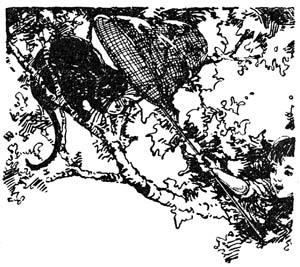
“I am not very hungry, and I can wait for my supper until you go to sleep. You will have to go to bed,” he thought.
At last the farmer could stand waiting no longer. He wanted to find that cat and lock him up so he could go to bed and be ready for an early start to headquarters in the morning. With no cat, there would be no use in going.
“I have it!” he at last exclaimed to his wife. “I’ll go unchain Towser and get him to smell out the cat for me. That dog is a[118] crackajack for finding cats. He hates them so—or most of them. This cat is the only one I ever saw him make friends with.”
So Towser was unchained and set to looking for Button. He ran around and around, smelling everywhere and he barked up the tree that Button had climbed. But still he had not found the missing cat. At last he got the scent, but just before he got to him Button shot out from under the bushes and ran up a tree.
“He has found him, found him!” called the farmer to his wife. The farmer had been close on Towser’s heels all the time, a bag in his hand. He had intended to put the cat in it when Towser caught him by the nape of his neck as he did most cats. But Button was too quick for them. He was up a tree before they could wink. The next thing was to get him down. The farmer, his wife and son coaxed and coaxed Button to come down but he just sat on a limb and blinked at them.
“Climb the tree and see if you can’t catch him,” said the farmer to his son.
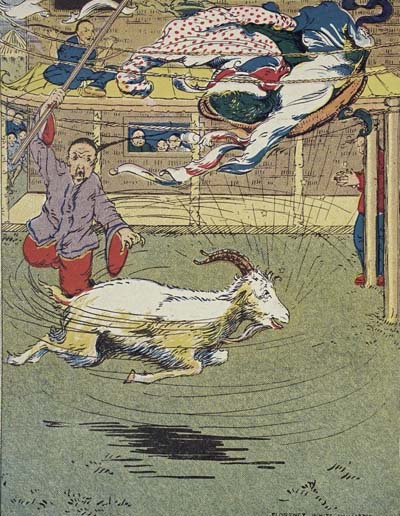
One thing Billy butted was a basket full of clothes.
(Page 67)
This the boy did, and Button let him come within reaching distance of him. Then he climbed a little higher up the tree. This kept on until he was away up in the topmost branches, and away out on a limb so thin that it would not bear the weight of the boy. When he saw this he took hold of the limb and tried to shake Button off by swinging the limb backwards and forwards with all his might.[119] But he might just as well have tried to dislodge the bark itself as Button. He simply stuck his sharp claws down deeper into the tree and enjoyed the swinging of the branch.
“Come down, Pierre!” called his mother. “We will try smoking him out.”
Pierre climbed down and they all busily set about building a big smudge fire under the tree. As it was a still evening, with no wind, the smoke rose straight in the air to where Button sat, but by shutting his eyes he did not mind it much and he sat on. The smoke made the farmer, his wife and son sneeze and cough and their eyes smart and water. That was all the good their fire did, for when the fire at last died out and the smoke had cleared away, they looked up in the tree and there sat Button as composedly as ever.
“Darn that cat!” exclaimed the farmer.
“Father, you must not swear, and before our son at that.”
“I can’t help it, for I am so mad at that cat I could kill him. And if he doesn’t come down pretty soon, I’ll shoot him and take his hide to headquarters.”
“That would do no good, for they say in their letter the reward will only be given if the dog and cat are alive and well,” replied his wife.
“Well, what next can we do to get him down? I am at the end of my string of suggestions.”
[120]The three sat down under the tree, their heads on their hands and elbows on knees, to try to think of some way to capture Button. After sitting there for about ten minutes, the son exclaimed, “I have it! I know how we can get him down and not hurt him in the least.”
“Let’s hear your plan, quick!” said the father.
“I’ll go up and saw off the limb he is sitting on, while you and mother hold a net under the limb. Then when it falls, the cat and limb will fall in the net and the cat won’t be hurt.”
“An excellent idea, my son,” commended his mother.
“But where are we going to get the net?” asked his father.
“We can use my tennis net.”
“Run and get it while I go for a saw and, mother, you stay here to keep him from escaping while we are away,” said the father.
Presently the father and son were back with the saw and the net. The boy climbed the tree, while the father and mother stood under the limb, waiting to catch Button when the limb should be sawed off. Button never stirred while the boy sawed the limb, for he had made up his mind what he was going to do when the limb fell into the net. This it did in about two minutes. The branch had scarcely touched the net when Button with a bound ran up the side of the net, jumped to the ground and ran up the next tree. And could you have looked into the faces of those three people, you would[121] have said you never had looked into three more disappointed ones in your life.
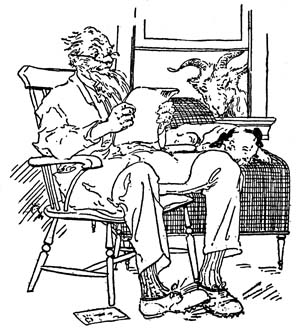
“That cat is possessed of the devil!” said the father.
“I truly believe he is!” said the mother.
“Well, gosh darn his skin, I say!” exclaimed their son.
“I have another idea,” said the father. “You go get your fish net and then you can climb the tree he is now in, and throw it over his head, and we will have him.”
The boy went after his round net on a long pole, climbed the tree and threw it over Button’s head, but just as it came down Button gave a leap for the next tree which was six feet away and lit on a limb as nicely as if he had been a flying squirrel and used to jumping from tree to tree all his life.
“Well, that cat surely beats the devil! He can stay in that tree[122] for all of me! I shan’t try to catch him any more. But I’ll just go and get some sleep, and in the morning we will go to town and get the reward for the little dog and say nothing about ever having seen the cat. Then when we come back, if he is still seen around the premises we will try some other plans to capture him.”
When they had all three gone to bed, Button came down out of the tree and ate the supper they had put out for him early in the evening. After finishing it he went over to the office and jumping up on the window sill he talked to Stubby and Duke through the window and told them how he had been having some fun with the family.
“Don’t worry, boys! You will be able to give him the slip as he takes you to town. And if you don’t, you can get away in a few days. I will go on and tell Billy what has happened and then the two of us will come back and help you escape.”

NO need to go for Billy or to tell him what has happened,” said a voice behind Button, “for I have heard it all.” Turning around, Button saw Billy standing under the window.
“Billy!” the three exclaimed in one breath. “Where did you come from?”
“The town where I was to meet you. I waited and waited and at last made up my mind that something must have happened to you, so I went back to the hospital, or at least I got nearly there last night when I saw ten or fifteen aeroplanes circling over the hospital. I made out that half were German planes and half American. The Germans evidently were trying to blow up the hospital by dropping bombs on it, and the Americans were trying to fight them off. As I looked, I heard a terrible explosion and by the light of the fire that followed I saw a big building go up in smoke and flames, and as I watched I saw distinctly two human figures outlined on the sky, flying up in the air with the débris. But when the smoke cleared away, I saw that the hospital still stood there and that it was the[124] big barn they had blown up. So the two figures I saw must have been those of the two spies who were going to try to bomb the hospital—those whose eyes you scratched out, Button. So you see they got their just deserts and were blown up themselves just as they had planned to blow up others. I was so thankful to see that it was the barn instead of the hospital that I ran straight on regardless of bombs dropping all around me. All I thought of was to see if Stubby was still in the hospital, and trying to save him, but before I reached there the American aeroplanes had driven off the Germans, and I saw three of their machines lying in wrecks on the ground, the work of the Americans.
“I went on to the hospital, and ran straight to Stubby’s ward to see if he was there, well knowing that in the confusion nobody would molest me. I passed the cook on the stairs and he was so excited and scared he did not pay the slightest attention to me. When I reached your ward, Stubby, I found your bed empty so took it for granted that you had started to meet me and that I had missed you somewhere on the road. So I started back, stopping at every farm I passed to look the place over to see if I could hear or see anything of any of you. A rooster at the next farm told me he had seen two dogs and a black cat pass their place at sunrise five days ago. Then I knew that you were either prisoners somewhere or I had passed you on your way to meet me. Now tell me[125] how it happens that you two dogs are locked in and Button still running outside.”
Between them they told Billy all that had happened since he left them, ending by relating how they were to be carried to headquarters early the next morning.
“Well, I guess not! Not if my name is Billy Whiskers will you two stay prisoners another minute. I’ll just hook the glass out of this window and you two can crawl out and then we will make a merry chase for the next village.”
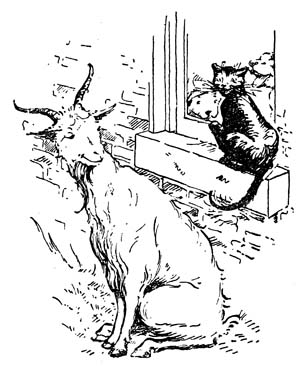
Billy did this, and as they passed the house, the soft-hearted Stubby said to the farmer and his wife, “I am sorry to make you lose your reward for my capture, as you have been very good to all of us. But even for you I can’t be a prisoner just so you can get some money by delivering me to headquarters. So au revoir, old friends!”
[126]“Good-by,” meowed Button. “And may you have better luck the next time you try to catch a black cat! Had you only remembered that black cats are said to bring bad luck, you would not have wasted so much valuable time in trying to capture me.”
“And many, many thanks for the good meals you gave us,” barked Duke. Then the four passed on into the darkness and were lost to the farmer forever.
“I think the best thing we can do,” said Billy, “is to push on to Paris just as fast as we can, and that won’t be very rapidly, as we shall have to travel by night most of the time and lie hidden in the daytime, since there are so many looking for us who are sparing no expense in advertising and searching for us. We are like regular escaped prisoners with a price on our heads.”
“The nearer we get to Paris,” said Duke, “the harder it will be to keep hidden, for the country is very thickly populated for miles and miles outside the city. But an idea just flashed across my mind that, if carried out, would get us inside Paris without much trouble.”
“What is it?” asked Billy.
“It is this: that we enter Paris by boat instead of on foot.”
“And how can we do that?” inquired Stubby.
“I’ll tell you. We will go to the banks of the river Seine, about five miles out of Paris, and try to get on one of the flat canal boats[127] that run right into the heart of the city, and we might be lucky enough to get on a boat that would pass right through Paris and continue on to the sea, where we could embark for America, as the river empties into the sea at a very large shipping port called the city of Havre. From this port there are big merchant ships sailing to all parts of the world, and we would get on one bound for America. If we could only accomplish this it would save us all that long, tiresome walk of about one hundred and twenty-five miles.”
“Gee!” exclaimed Button. “Your plans sound good to me! Saving a hundred and twenty-five mile walk, dodging people, bad boys and troublesome dogs, is worth trying.”
“I should think it did sound good!” said Billy, “and I feel quite sure we can carry it out, for Stubby, Button and I have had lots of experience sneaking on ocean-going vessels, steamers, and so on. We have stolen on board a vessel going from Japan to America, and on still another sailing from Boston for Constantinople, and another plying up and down the Mississippi River, with others too numerous to mention. So I guess we can manage to get aboard a slow going canal boat.”
“Of course we can!” said Stubby. “I feel like thanking you for thinking of such a plan. It is such a good one for us all but more especially for me with my lame leg.”
“About how far do you think we are from Paris now?”
[128]“I should say fully twenty-five miles. But only about seven from the river if we take a straight line to the east until we come to it.”
“Then me for the straight line to the river!” declared Billy.
“Same here!” said Button.
“And I follow wherever you lead,” avowed Stubby.
The four made such good time that by daybreak they were in sight of the river, catching their first glimpse of it from the top of a high hill.
And joy! they saw straight ahead of them a small town at whose dock lay a long white-and-green boat with a flat top. It was so early in the morning that no one was astir in the town when they reached it, so they were not molested as they ran through it straight for the boat. When they came close to the dock they proceeded more cautiously and hid behind boxes and barrels until they could find out what kind of people were on the boat. But no one appearing and the dock being deserted at this time of the morning, they decided to chance finding nice people on board, and crept on deck. This they did easily as the owner had neglected to pull in his gangplank before he went to bed.
“It looks as if our good angel was with us and it was intended we were to make this trip in this way,” remarked Stubby.
“Now we must all secrete ourselves and keep hid until the boat is loaded and pushed off shore. Then they will have to take us[129] with them until they reach the next stopping place, and if the worst comes to the worst we can jump overboard and swim, for it is not far to shore and the boat is not high above the water line.”
Billy secreted himself behind a pile of bags filled with hops, while Stubby and Button climbed on top of them and hid themselves between two of the top bags, and Duke squeezed himself under them in a hole made by two of the bags which had not been packed closely. So by the time the sun was well up and the people began to arise, they were all stowed away as comfortably as could be.
The first person on deck proved to be a big, comfortable looking fat man, followed by his grandson, a little fellow with curly, flaxen hair and big, blue eyes, whom it was easy to see the grandfather fairly worshiped.
Then three men came up from below and began fussing around on deck. About this time the delicious odor of boiling coffee, fried potatoes and bacon was wafted up the hatchway.
“Gee! The fumes from that cooking make me hungry as a bear!” said Button.
“Me too!” agreed Stubby.
“And it reminds me that none of us has had a bite to eat for hours. We were so busy getting away from our pursuers that we forgot to stop to look for something to eat,” said Duke.
[130]“That may smell good to you fellows, but that white clover beside the dock, with the dew still on it, smells better to me. And when they go in to breakfast, if they still keep that gangplank out, I am going to come out of this hiding place, skip ashore and eat a mouthful or two before any of the people on board are through their meal and come up on deck again,” said Billy.
“You are lucky that you can live on grass and green things,” replied Duke. “I wish I could.”
“That is the only trouble dogs and cats have when traveling,” said Stubby; “this matter of food. One has to steal it, or eat it raw, and run the risk of being clubbed or stoned unless he falls in with some one who is kind to animals and doesn’t think it is too much trouble to feed and water them.”
“Most people seem to forget that animals have to eat and drink the same as human beings. They know better, but they just do not think,” said Button.
Billy did as he had planned and slipped off the boat and made a hearty breakfast of clover and took a good drink of water out of the river. Then he was fixed for the day if need be.
“Mew! Mew! Mew!”
“Hark! I hear a cat mewing!” whispered Button to Stubby who were close together upon the pile of hops.
[131]“I see her,” said Stubby. “It is only a little kitten. Sh-sh-sh! Here comes a woman up from below with a plate of food for the kitten.”
“Kitty! Kitty! Kitty!” called the woman, looking around for the cat and paying no attention to the mewing kitten at her feet.
“Evidently she is looking for the mother of the kitten,” whispered Button.
As they watched, they saw a big yellow cat jump out from a pile of rope up near the prow of the boat and walk lazily toward her. A black and white spotted cat also came running from the opposite side of the deck.
“They seem to have a whole family on board,” remarked Stubby.
When the woman saw them coming, she set down a heaping plate of food for them and said, “Well, lazybones,” addressing the yellow cat, “did you catch that big wharf rat I saw run on board last night? If you did not, you better hustle and get him if you want any more to eat from me. I am not going to feed you anything until that rat is killed. Do you hear me? Old Mouser has been doing all the work lately in catching the rats and mice, and it is time you did something, for we want no free lazy passengers on this boat. Baby,” addressing the kitten, “stop crying and mewing around my heels. If you are hungry, eat something on the plate. Oh, I forgot,[132] you are too young to care for meat and potatoes. Come with me and I will get you some milk to drink,” and she picked up the kitten and went below.
The cats were evidently not very hungry, for they scarcely touched the food on the plate, but walked off and left it, the spotted cat going down the hatchway and the yellow cat back to the pile of rope up front.
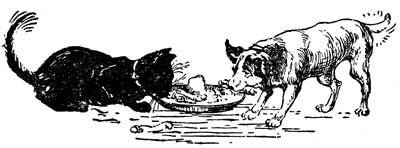
“Now is our chance, Stubby,” whispered Button, “before any one comes up from breakfast!”
The two of them climbed down from the hops and made a good meal of what the cats had left, as the woman had brought up a plate heaping full.
“Tell you what, that tasted good!” said Button.
“Indeed it did!” replied Stubby. “I did not know I was so hungry. But I was as thirsty as the very dickens. I hate to chance[133] going off the boat for a drink, but I’ve simply got to have water. I think I can chance it to run off and lap a few mouthsful before they come up and pull in the gangplank. I am going to try it anyway. Are you coming?”
“No; cats drink very little water, and I do not feel the least bit thirsty now.”
Stubby succeeded in getting his drink and was safely back on board before any one appeared. But he did not have a minute to spare as his short, stubby tail only just disappeared out of sight when all the men, including the Captain, came on deck. Then the Captain bawled out in his big voice for them to heave in the gangplank and cut loose. In less than fifteen minutes the old boat was out in the middle of the river, floating down toward Paris on the swift moving current.
“Gee, it seems good to be in a safe place once more,” said Billy, “where one can sleep without keeping one eye open for fear of capture or of being blown sky high by a carelessly dropped German bomb. I am just going to sleep and sleep and sleep while on this trip and get good and rested.”
“And I am going to do the same,” replied Duke.
[134]

ALL day long the four of them kept hidden. At noon Stubby, Duke and Button ate what the cats left, and Billy ran ashore and ate a little grass by the river bank, where the boat had tied up for noon.
The Captain and his crew seemed in no hurry to get to Paris or anywhere else, for that matter. All they seemed to do was to eat, sleep, tell stories and smoke.
It was getting to be about half past nine, and the dogs and Button were growing hungry for their supper which they could see on the plate by the gangway, but could not go to get it as the sailors were still lounging on deck talking and smoking.
“Will they never stop their silly talk and go to bed?” sighed Button.
He could not hear a word of what they said, but he called it silly because he was so cross at them for not going to bed. And as they talked, a big black wharf rat sneaked up behind them and began to help himself to the meat on the plate. It was too much for the hungry Button to lie there and see his supper or what he considered his, eaten up before his eyes by a nasty old rat. Forgetting[136] that he might be caught by the sailors, he sneaked off the pile of hops and crept to within jumping distance of the rat. Then with one long flying leap, he landed on the rat’s back and buried his teeth in his neck and his claws in his sides. It was a powerful rat, as I said before, and gave fight. Soon the two of them were rolling around on the deck, with first one on top and then the other. The scuffle they made added to the squeal of the rat brought all the sailors to their feet and there they stood watching the fight and wondering where the big black cat came from.
All of a sudden the rat let go of Button’s ear and buried its teeth in his neck, causing the blood to flow freely. On seeing this Stubby forgot all caution and came running to Button’s assistance.
“Holy Moses! And where did this dog come from?” asked the Captain. “He must have dropped from the sky.”
Stubby tried to grab the rat by the back of its neck as it clung to Button’s throat, but he could not as they kept rolling over and over each other so that first one was on top and then the other. At last in trying to stoop and get a grip he turned his broken leg the wrong way and the pain was so intense that he fainted dead away and the sailors thought he was dead. So did Duke, who was watching the struggle from the top of the hop pile with Billy. When they saw Stubby roll over and stretch out they both bounded off the hops and appeared on the scene.
[137]“Jumping Jupiter! What have we here? A menagerie?” exclaimed the Captain. The sailors all stared at Duke and Billy as if an elephant had appeared in their midst, while from the other end of the boat came the yellow cat and Mouser. And still the fight went on, with the Captain, three sailors, two cats, one dog and a goat watching, all having formed a ring around the fighters.
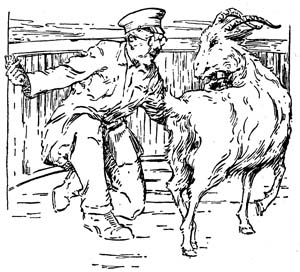
Billy saw that Button was growing weak from loss of blood and though he did not wish to interfere in Button’s fight, still he felt it best under the circumstances to do so. So he watched his chance and ran one long horn right through the rat, killing him instantly. Then with the rat still sticking to his horns, he walked to the side of the boat and scraped it off, and it fell into the water.
This was such a smart thing for a goat to do that the Captain clapped his hands and cried, “Bravo! Bravo! Bravo!” in which[138] all the sailors joined him. Their clapping and cheering brought the Captain’s wife on deck to see what all the commotion was about, and when she saw the strange animals on board, she said,
“When did you buy this menagerie? I never laid eyes on them before.”
“Nor any of us,” answered the Captain, “until two or three minutes ago,” and he related to her what had taken place.
“This fight never would have happened if that lazy yellow cat of ours had done his duty and caught that rat.”
“But if he had, none of us would ever have witnessed the most desperate bloody battle any of us ever saw between a cat and a rat.”
“I wonder to whom these animals belong and when they came on board,” mused the Captain’s wife.
“They must have come on board the night we forgot and left the gangplank out,” said the Captain.
“That is just when it must have happened,” agreed the sailors.
“They probably belong to some one person as they are all together, and I should judge from their appearance that they are very valuable. See,” said the Captain’s wife, “they all have medals around their necks, and one dog wears a Red Cross badge sewed on his body.”
The Captain stooped down in front of Billy and began to read what was on his badge.
[139]“Wife, come here! Come here!” he called in excited tones. “What do you think I find engraved on this badge? This goat is the celebrated Billy Whiskers, the Mascot of the —th New York Regiment!”
“You don’t mean it? Not the goat that the big reward is offered for? You don’t mean that, do you?”
“Yes, I do! The very same!”
“And this little dog and the black cat are mascots, too, other regiments offering a big reward for their return. I read about these very animals in one of the Paris papers this morning. I’ll go get the paper and read it to you,” she said.
In a jiffy she disappeared inside the boat but came out again, waving the paper. “Here it is! Now listen while I read to you all what it says:
LOST, STRAYED OR STOLEN
One large white goat, belonging to the —th Regiment of New York
One small yellow dog, belonging to the —th Regiment of Pennsylvania
One big black cat, belonging to the —th Regiment of Illinois.
Any person or persons returning the same to their respective Headquarters will receive $1,000 reward for each animal alive and well.”
She jumped up and went springing and dancing around the deck.
“Here we have all three of them right here on our boat! Ho[140] for the reward! I see where we get it when we return from this trip. We will take the best of care of them, but keep them hidden from others until our return trip. Then we will take them to Headquarters and claim the reward.”
“Well, you won’t get any reward for either the cat or the dog if you don’t fix up the wounds where that rat bit them, for they are losing so much blood it will kill them,” said the Captain.
“Here, some of you give me a hand and help me dress their wounds,” said the Captain’s wife, who was as good as any trained nurse when it came to dressing wounds and looking after the sick. “I’ll go ahead and get warm water, witch hazel and bandages ready, while you carry them down to my stateroom and lay them on the bunk.”
When Stubby came out of his fainting spell, he found himself lying on a bunk beside Button, who had a bandage wrapped around his neck, and smelling strong of witch hazel, besides having several crosses of adhesive plaster on his sides and on the tip of his nose.
“How did we get here and what has happened to us?” he asked.
“What a fool thing for me to faint just when you needed me most!” said Stubby.
“How did you happen to do it?” asked Button.
“I turned my broken leg the wrong way, and over I went.”
“But who helped you in the end? Did some of those men come[141] to your rescue? I should think they would have helped you before and not stood there and see that monster rat biting you with its poisonous teeth.”
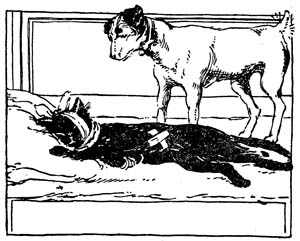
“No, Billy came to my help as usual. He forgot he was in hiding and jumped in and ran his horn straight through the rat, which made it let go my throat, as he had killed it instantly. I never met such a big rat before or one with such long, sharp teeth. When it cried, its voice sounded like a baby’s. I shall be all right soon as the Captain’s wife has fixed me up fine so the poison from the rat’s teeth won’t hurt me. As it turned out, this fight was the best thing that could have happened, for since they read our medals, every one is as keen on keeping us on board as we are in staying. They have found out who we are, and are now looking out for the reward. But they intend to take us along with them to the coast and on their[142] return will hand us over to our respective regiments and claim the money.”
“How did they know there is a reward offered for us?”
“Why, the Captain’s wife had just finished reading about us in one of the Paris papers.”
“We certainly are in luck! Here we shall have the best of care and get clear through to Havre without walking one step. And when there we can give them the slip as we did the farmer and his wife.”
“I know; but it does seem a shame that we always have to run off and appear so ungrateful to our kind friends, doesn’t it?” said Stubby.
“Yes, it does; but it really can’t be helped,” replied Button. “Where are Billy and Duke now?”
“Oh, they are having the time of their lives being petted and fed by all on board. You see we will fare like princes for the rest of our journey.”
Button was right. Nothing was too good for them and the way they were fed, watered, combed and brushed would have satisfied a king.
“My, don’t they all look fat, sleek and shiny!” said the Captain’s wife after they had bathed and curried all four of them. She had taken off the dirty bandage that was around Duke’s body and put on a nice clean white one with a lovely Red Cross embroidered on it.

THE rest of the journey to Paris was quite uneventful. They arrived there one evening just as the sun was setting behind the city, throwing the Eiffel Tower and the big square dome of Notre Dame in bold relief against the deep red sky.
Just on the outskirts of the city they came to an island on which was a good-sized cemetery.
“What a nice place for a cemetery!” exclaimed Stubby.
“There seem to be a good many people buried there from all the monuments I can count,” said Billy.
“You may count the monuments and walk or drive down the broad paved roads and walks but you will never pass one grave where a human being is buried,” said Duke.
“You are joking!” said Button. “What do you mean? That there is no one buried there now and that all the bodies have been removed? Bet I hear men chiseling monuments at this minute and soon can see them at work in their shops.”
[144]“True again. But for all that there is not a human being buried there, for it is a dog cemetery where only pet dogs are buried.”
“Well, wouldn’t that beat the Dutch!” exclaimed Billy. “A regular cemetery with flowers on the graves and flower-bordered walks and fenced-in lots and monuments just like people have! It certainly does take the French to think of odd things!”
“Why shouldn’t pet dogs have a nice resting place?” inquired Duke. “They are man’s companions and guard and watch over him as if they were human. Yes, and they are more faithful than the dearest human friends, for they stick when adversity overtakes one, when often a human friend one has counted on proves false. But never a dog! There is one monument there that has this inscription on it in French, but I will translate it for you into English. It reads: ‘The more I see of men, the more I love dogs.’ Pretty hard on his friends, wasn’t he?”
“I bet some one he loved played him false, don’t you?”
“It would seem like it from that inscription,” answered Billy.
“But hush! I hear a bell tolling,” said Button.
“Yes, they toll the bell when a funeral enters the gate just as they do in all cemeteries,” explained Duke.
“Look, fellows!” said Stubby. “There comes a little white hearse just like the ones they use to take babies to the cemetery, and see the autos that are following! Why, it is a regular funeral, with[145] a wreath of flowers on the casket and everything else complete!”
“Certainly! Everything is done just as it is in a cemetery for people and not one thing is left out,” replied Duke. “If you should walk through, you would see on some of the graves the playthings the dogs liked when alive.”
“Really?” said Stubby in amazement.
“Yes, really!” replied Duke. “I had hoped to be buried there myself some day, but now I expect my grave will be a shell hole on the field of battle.”
“Oh, no, it won’t now since you are going to America with us.”
“Over there your grave will probably be made under a rose bush or in some nice quiet orchard or back yard of the family with whom you live,” said Billy.
While they had been talking, the boat drifted away past the cemetery and they were getting near Paris. They had just fixed themselves comfortably on deck to enjoy the approach to the city and watch the people on the banks and wharfs as the boat floated by when the Captain appeared and said,
“Sorry to disturb you, fellows, but it is necessary that we shut you below while we are in the city. If we don’t, some one may see you who has read the papers offering a reward for you and they would come aboard and take you off.”
“Oh, bother that old reward!” from Billy. “I don’t want to be[146] shut in out of the air in that stuffy cabin. I want to be out here where I can stretch my legs and breathe good fresh air.”
Just the same, Billy with the others was shut in a stuffy little cabin scarcely large enough to hold them. There the four of them fretted and grumbled and pouted, but to no purpose.
They had been there about two hours when they felt the boat scrape along the side of a dock, and they found their porthole looked out on the wharf side of the boat. Button soon took advantage of his powers of climbing and sat in the porthole, from which place he could look out and tell the others what he saw.
The boat had come to dock right opposite the Eiffel Tower and on that side of the river. By sticking his head out of the hole he could also see the big Hippodrome with its grassy lawn and flower beds and benches for tired pedestrians to rest on.
“Gee!” exclaimed Billy, “but I would like to get out of this and kick my legs on that lawn and eat some of the grass, for I am awfully tired of the food on this boat. It is all right for people, cats and dogs, but rather dry for goats.”
The next morning the Captain appeared at their door and said, “Now, Chums, here is a good breakfast for you, and a drink of water. Awfully sorry to shut you in, but I have to under the circumstances. Ta-ta until night! We are going up into the city to do some shopping, but One-Eyed Dick is going to stay aboard to look[147] after things. Again ta-ta!” and he slammed the door and was gone.
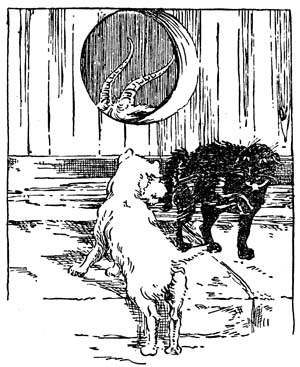
“Drat him!” exclaimed Billy. “I want to go walking in the park!”
The four ate their breakfast in silence, then lay down to sulk the day away, when all of a sudden Button jumped up and climbed into the porthole again.
“Heigho, fellows! The way this boat lies now I can jump from this porthole onto the dock. And if I don’t leap as far as I mean to do, I will only fall back on deck and not go into the river. I am going to try it anyway. So here goes!”
With a long, flying leap he made it, landing right in front of a dog that chanced to be wandering along the dock just then. The dog made a bound for Button. But Button, contrary to the ways of[148] most cats, stood his ground instead of running and before the dog knew what had happened to him, Button had slapped his face and scratched his nose, leaving a long, red mark down its length, and had disappeared up the path leading to the park.
“I heard Button spit as if he were mad, and then a dog barked,” said Stubby. “I bet he met a dog.”
“I know what we can do,” said Billy. “I can stand under the porthole and then, Duke, you and Stubby can get on my back and jump through the porthole. I am quite sure I am high enough so you can make the jump.”
“But what good will it do even if we can reach the hole? We don’t want to go ashore and leave you here alone.”
“That is just like you, Stubby, to spoil your whole day to stay with a friend that can’t get out. You are too generous. I shan’t let you sacrifice yourself like that for me. You and Duke go, and then you can come back and tell me what you saw. If you stay, I have to stay just the same, and lose the fun of hearing what you fellows do ashore. So jump up on my back and let’s see if you can make the hole.”
Stubby demurred, and so did Duke, but Billy at last prevailed on them to go.
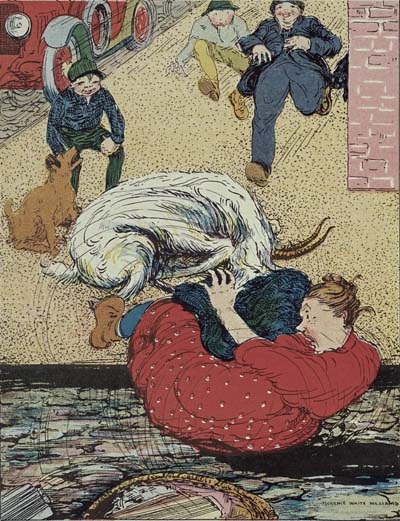
The first thing Billy knew, he was rolling over something soft
that squealed
like a stuck pig and that kicked like a calf.
(Page 155)
Stubby made the hole and landed on the wharf all right, but Duke[149] was large and the first jump he made he hit his head and fell back into the cabin. He was so fat he made a tight squeeze for the hole but on the second trial he made it. Then he attempted to push and squeeze himself through the hole. To do this he had to go head first, which made him fall on the deck on his nose. But it did not hurt much and no one saw him. He barked back to Billy that he was all right and was going to run up into the city and visit some of his old haunts.
“I’ll steal a bunch of carrots for you from some vegetable stand,” he barked back.
Billy fussed and fussed and kicked around until the cabin looked as if a whole drove of kicking mules had been shut in it. Then all of a sudden he stopped and said to himself,
“What a fool I am, kicking and butting things around here! Why don’t I butt down that old door? It will be easy to do and then I too can go up into the city.”
To think was to do with Billy. And crash! went the door and out through the wreck went Billy. When he arrived at the top of the hatchway he met One-Eyed Dick coming down to see what had caused all the noise. On seeing Billy, he tried to shut the hatchway to keep Billy in by sitting on it. But the next thing he knew the door was lifted up under him and he found himself slipping[150] off. Before he could get to his feet Billy was out and off the boat, and that was the last he saw of Billy for that day.
Duke had just reached the front door of his old home when who should come out of the house but his old master, the one who had taken him to war with him and made him a Red Cross dog.
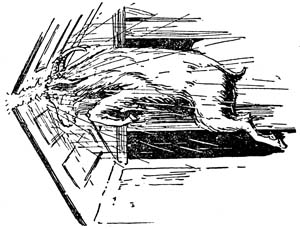
“Duke, you old sport, where have you been and how did you happen to turn up here just now when I was returning to the front and planning to stop at the dog hospital to get you?”
His master picked him up in his arms and hugged and hugged him until Duke thought his ribs would be crushed in.
“I am so glad you came for now I shall not have to go out of my way to get you. We are on the eve of a big battle and we will both be needed at the front.”
“Here is where I give up going to America,” thought Duke. “But it is all for the best, for since I have seen my old master again and found how he loves me, I think it would have been a mean trick[151] to desert him while he is in danger of his life every moment. But I do wish I could have gone back first and said good-by to Billy, Stubby and Button. They are the three finest friends a dog ever had.”
While Duke was thinking this, his master was carrying him to a big touring car and in a few seconds they were breaking the speed laws of the city.
[152]

AS soon as Billy found himself on shore he ran as fast as ever he could up into the city to try to find a grocery store where he could get some fresh juicy vegetables or fruit. He was tired to death of dry hay, straw and carrots that had been fed to him on the boat, though the Captain thought he was giving Billy just what goats like best.
Stubby and Button saw him disappearing down a side street and started to follow him.
“How in the wide, wide world do you think he managed to get out of that cabin?” asked Stubby.
“I am sure I don’t know,” answered Button, “for I am sure he could not possibly crawl through that porthole even if he could reach it. He is too big.”
“You don’t suppose he butted down the cabin door, do you?” asked Stubby.
“I should not wonder in the least if he did, and come to think of it, I bet that is just what he did do, for that is the only way he could possibly leave that cabin. Perhaps old One-Eyed Dick[154] opened the door to give him a drink or to get something out of the cabin, and Billy butted him over and escaped. However, we will soon find out when we overtake him.”
“But where is he? I don’t see him anywhere,” said Stubby.
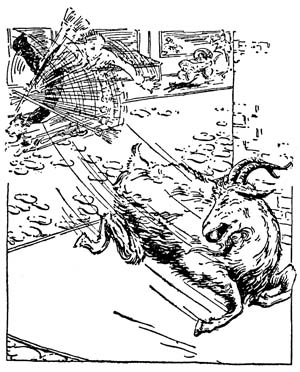
When Stubby and Button reached the side street down which they had seen Billy disappearing, no Billy was in sight. But as they stood there debating what had become of him, and wondering where they would look for him, they saw Billy run out of a fruit store with a big apple in his mouth, followed by an angry Frenchman madly jabbering and waving a broom over his head, with which he was trying to hit Billy. He was just about to bring it down on Billy’s back when Stubby ran between the man’s legs and tripped him. He got up with an oath and started to chase Stubby when Button ran in front of him and down he went again. He was[155] so busy watching Billy and Stubby that he had not time to cast his eyes down to see what was under his feet or where he was stepping. This time he fell flat on his stomach, which knocked the breath out of him so he could not rise again and chase them. And he sat there trying to get his breath until he saw them turn a corner and disappear, though he had the fun of seeing a man knocked over as he himself had been by Billy running into him as he turned the corner. Billy did not see the man as his head was turned to see if the fruit dealer was still pursuing him. And when he looked ahead, he was surprised to find both Stubby and Button following him. He still had his head turned when he ran into a fat woman going the same way he was, a big basket of clean clothes on her head. The first thing Billy knew, he was rolling over something soft that squealed like a stuck pig and that kicked like a calf. He lost his own balance and rolled over in the gutter. All this commotion caused a crowd to gather around them in no time, and Stubby had to bark and growl and nip the heels of the people to make a clearing so Billy could get up. Soon the police were upon them, swinging their clubs and crying out in French for the crowd to make way and clear the street.
The fat woman was crying and trying to gather up her wash which had spilled in all directions, and she was afraid the people would steal some of the pieces or step on the clean snow-white bosoms of the shirts.
[156]“Here, don’t you put your dirty hands on that shirt!” she called to a boy who was going to try to help her pick up her scattered things.
“Police! Police! Stop that woman! She is trying to hide a lady’s skirt under her shawl!”
Stubby felt sorry for the poor laundress and he watched to see if any of the crowd tried to steal her things.
Presently a bootblack picked up a nice fine white dress shirt and attempted to hide it under his short jacket, but the shirt was too long to conceal even when folded, and when it unfolded a long white tail stuck out. A policeman made a grab for it but the boy dodged and ran down the street with the shirt dangling between his legs. When Stubby saw this, he started in pursuit and soon overtook the boy. He made a snap at the flying tail, caught it in his mouth, gave a jerk and the shirt slipped from the boy’s hold, wound itself round his leg and tripped him. The policeman coming up just then caught the boy and gave him two or three sharp raps with his club together with a kick and told him to go about his business while he carried the much prized shirt back to the laundress.
“Thank you! Thank you, sir, for saving that shirt! It belongs to the man at the head of the Police Department and I’ll tell him how smart you are on your beat and get you promoted for helping[157] a poor working woman out of her troubles,” and she wiped her eyes and began to count her pieces to see if they were all there.
While the police was keeping the crowd from bothering her, the three Chums sneaked away and decided to return to the boat for they did not want to be left in Paris. Their destination was Havre for the present and America next.
About six o’clock when the Captain, his wife and the sailors came back to the boat, they found Billy, Stubby and Button all lying out on deck enjoying themselves.
“Look, will you?” exclaimed the Captain. “There are those animals I locked in the cabin quietly lying on deck. One-Eyed Dick must have let them out. I’ll fix him for disobeying orders!”
But when he came aboard there was no One-Eyed Dick to be found.
“So-ho! When we left, Dick must have decided to go too and while he was away these animals have broken out of the cabin.”
While the Captain was talking, his wife had gone below to take a look at the cabin and find out if possible how they got out. She found, as you know, everything kicked and scratched to pieces and the door smashed to bits. She called to the Captain to come see what had happened. But just as he was leaving the deck he saw old One-Eyed Dick running toward the boat, all excitement.
[158]“What is up, Dick? And why are you running?”
“Come quick! Come quick! I am on the track of the three of them!”
“Three what?” asked the Captain.
“Why, the runaway animals! Don’t stop! Don’t stop to talk a moment or we will never catch them! I’ve been all day trying to get track of them and now I have, come quick or we will never lay eyes on them again!”
“Are you crazy, man, wanting me to run find animals that are already found?”
“What do you mean?” asked Dick.
“Look over on the other side of the deck and you will see what I mean.”
“Jupiter! How ever did they get here? And me following them from place to place only to be told they had just been seen turning a corner here and a corner there!”
“But why did you let them out in the first place?”
“Me let them out? Why, bless your life, that big goat let himself out after breaking up the whole of the inside of our boat and butting the door down as if it had been made of paper and me off the hatchway as if I had been a bale of cotton. You don’t know that goat, you don’t!”
[159]“Come down here, I say, and see all the damage that goat did,” called the Captain’s wife again.
“Well, thunder and lightning! He did leave a pretty mess, didn’t he?” exclaimed the Captain when he saw what Billy had done.
“Oh, Captain, come up! There is a man wants to see you,” called One-Eyed Dick down the hatchway.
When the Captain went on deck, he saw standing talking to Dick a poorly dressed, shifty-eyed individual. “Well, my man, what can I do for you?” asked the Captain, but as he passed one of his sailors he said in a low voice to him, “Get those animals below as fast as you can, and keep them out of sight!”
The sailor obeyed, and he got Stubby and Button down but when he came up for Billy he heard the man say,
“I’ve come for me pets. And you need not try to hide them. I tracked ’em here not half an hour ago and I been waitin’ for youse to come back as I didn’t like to take ’em without tellin’ ye that them belongs to me.”
“You hear? Get off this boat or I’ll have Billy butt you over the Eiffel Tower! What do you mean by coming here and telling me such a cock and bull story as that?”
“’Deed them is my pets! And if you don’t give ’em up to me I’ll call me chum and prove it.”
[160]“Get off my boat, you stupid liar, or I’ll call the police!”
“I’ll go get the police meself and have you arrested for holdin’ stolen goods!”
“You will, will you? Well, here, on your way there you better take a bath in the river and wash up. They’ll be better pleased to see you after you have had a clean-up than the way you look now,” and with that the Captain walked over to the man, took him by the seat of his trousers and the collar of his coat and threw him overboard into the river. The fellow being a regular wharf rat swam ashore, swearing vengeance on the Captain, but he never showed up afterwards.
“Well, that fellow displayed more cheek than I ever saw before, asking me to give up Billy, Stubby and Button on the strength of his saying they were his pets. But it goes to show that he had read the advertisements in the paper, and since others may have read them also, I guess we better pull up anchor and proceed on our way.”
It was an hour after this when all were at supper but Dick, who was sitting whistling and braiding ropes, when a dapper young American orderly appeared at the gangplank and called out: “Hey, there! Have you seen a big white goat, a little yellow dog and a black cat around here any time to-day?”
“No, sir; I haven’t laid me two eyes on them,” said Dick with a[161] straight face, though his good eye did wink once or twice at the fib. “Why, sir? Have you lost them?”
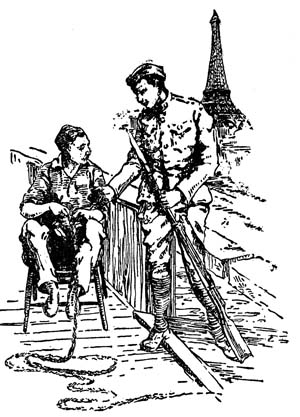
“No, I haven’t, but one of them belongs to my regiment and the other two to two other regiments. And we have been looking everywhere for them and advertising in all the papers. But every time we hear that they have been seen in a certain locality and go to get them, they are gone. And I just heard this afternoon that three animals answering to their description had been seen coming this way.”
“Well, I have been here nearly all day, and I haven’t laid me two eyes on any goat, cat or dog.”
No, to be sure he had not laid his two eyes on them for he had but one eye with which to see.
[162]The young orderly went off, inquiring on every boat that lay along the dock if they had seen a goat, dog or cat anywhere around there that day.
“Captain! Captain!” called Dick down the hatchway. “We have had another close call. A young orderly from the very regiment Billy belongs to was here inquiring for him and the other two.”
“And what did you tell him?”
“Just said, ‘No, I have not laid me two eyes on them.’”
“Haw, haw, haw!” laughed the Captain. “You did well to turn him off in that way, even if it was half a lie. But it shows we must not tarry another minute here or the next thing we know they will be sending the police for them. Here, call the other sailors and let us heave to and be off.”
And presently Billy said to Button, “We are moving! Thank goodness we have started on our homeward journey once more!”
Nothing of interest happened on the rest of the trip to Havre except when a little bird flew on deck with a message for Billy from Duke.
“Why, I did not even know he was gone!” exclaimed Billy. “I took it for granted he had returned to the boat when I was away, and was now asleep somewhere on it. What did you say he said, and where was he when he told you?”
[163]“He was in a big touring car, just leaving the outskirts of Paris. He was with his old master who is a celebrated surgeon at the front and they were both going back to his hospital. Duke told me to tell you that he was very sorry to leave you all without a chance to thank you for being so good to him and to say good-by. When he left the boat he had only intended to run up in the city and take a look at his old home, but when he got there who should he see coming out of the house but his old master, who was just going to get him at the dogs’ hospital, where he thought Duke had been all this time. And Duke said to tell you that when he saw his old master again, all his love for him came back and he could not bear to leave him to run away to America.”
“Well, if that doesn’t beat all!” exclaimed Button.
“I think it is just as well he left us,” said Stubby, “for I am afraid he would not understand our free and easy life in America after living all his life with formal people.”
“Guess you are right,” agreed Stubby and Billy.
[164]

YOU will be surprised to learn that the Chums had no trouble whatever in sneaking off the canal boat and secreting themselves on a packet bound for Queenstown that night.
Before boarding the boat Billy said, “This boat is not sailing for America, but we must take any boat we can get on to escape from France where we are so well known. If we don’t, we will be captured and sent back into the army in no time. When we get to Queenstown, we can ship on another bound for the United States of America, for many boats stop there before crossing the ocean to pick up the last mail from England.”
The boat they were on left the dock at about half past nine, with all lights out, as was necessary to avoid attracting the attention of the submarines that infested those waters. For a wonder the Channel was smooth as glass and as the night was clear, with a big moon shining, anything afloat on the water could be seen for miles.
“Keep your weather eye peeled for submarine periscopes!” said[166] Billy to Stubby and Button as they lay on the forward deck, looking out over the water.
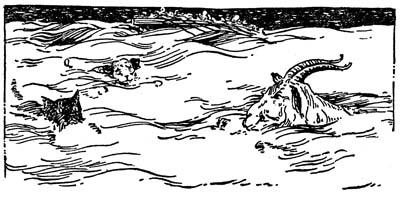
It was after midnight and every one was in bed but the officers of the ship and the sailors on the lookout for submarines when Billy’s sharp eyes saw something that looked like a log of wood standing straight up in the water. Before he could call out, “A periscope!” a black object was seen skipping over the surface of the water and the next thing he knew he was flying up in the air amid a spray of water. When he came down he struck the water about a hundred feet from where he went up and he felt himself going down, down, down toward the bottom of the ocean. But it was too deep for him to strike bottom here, so after going down, down, down, he began to come up, up, up, and when he got to the surface and shook the water out of his eyes, he looked around to see if he could discover[167] Stubby or Button. And oh, joy! there they both were swimming towards him unhurt.
Luckily for them, not one of them had been injured in the least. Just then a big piece of wreckage that would act as a raft floated near them and they all crawled upon it, and were just in time to see what was left of the packet sink beneath the waves. They also saw that two lifeboats were afloat toward which many black heads could be seen swimming. Soon the swimmers reached the boats and climbed into them, and Billy saw they were the Captain and officers of the ship along with some of the sailors and passengers. As soon as they were in the lifeboats, they began picking up the people they saw in the water, and as there were but few passengers aboard all were saved. For a wonder the U-boat did not send another torpedo after them which in all probability they would have done had they not been frightened away by a guard boat coming to the rescue. After it had chased the submarine away, it came back and picked up all the passengers of the lifeboats and steamed away toward Ireland with them as they happened to be very near Queenstown.
Now none of the people had seen or heard the Chums on their raft though Billy baaed, Stubby barked and Button mewed.
“Well, there are two or three things to be thankful for,” said Billy. “First of all, we are alive and unhurt. The next is that the tide is carrying us inshore instead of out to sea, and the wind is blowing[168] that way too. But most important of all is the fact that we are not far from land, and if the tide doesn’t turn and carry us out to sea, we should reach land at the rate we are floating now in about two hours. If we see the tide is turning, we can jump off the raft and swim for shore.”
“You would see some good in every situation, even if your home was burning,” declared Button.
“Well, wouldn’t you?” asked Billy.
“No. I nearly always feel despondent when in bad luck until I get mad and think what is the use. Then I make the best of whatever comes, while patient little Stubby here says nothing but just saws wood, as the saying is.”
Soon after daylight the raft touched the shore, and the Chums lost no time in leaving it, I can tell you. In the distance up the shore they saw a number of fishermen’s cottages. Stubby and Button proposed to walk up to them and see if they could not get something to eat, while Billy waited for them near by and made his breakfast of shamrock, for they were on Irish soil, the native heath of the shamrock.
The fishermen received them kindly, and gave them plenty to eat and drink. Then a quarrel arose as to who should own the dog and cat that had come to them so strangely. At last it was proposed[169] to auction them off. The bidding was in kegs of fish instead of in money, however.
While the excitement of the bidding was going on, Stubby and Button thought it a good time to steal away and join Billy. The last Stubby heard were these words, “I’ll give three kegs of fresh fish for the little dog!”
When they got back to Billy, they hurriedly told him what was up and explained that the men Billy saw waving their arms and shouting were only bidding in the auction and not preparing to fight each other.
“But we better scoot out of here before they miss us or we will be captured and tied up.” And for the next half hour the Chums ran straight inland, only stopping long enough to get their breath, then running on some more. They were not followed, however, and at last they slowed down beside the roadside to listen to the passersby, to try to find out what part of Ireland they were in and how far it was to the nearest seaport from which large vessels sailed. Imagine their joy when they found they were only four miles from Queenstown and on the direct road that led there!
It was no trick at all to reach that city and when they arrived they went straight to the wharf to look for a boat to carry them still nearer America.
[170]“Look! Billy, look!” exclaimed Stubby. “There is a big camouflaged troop ship lying at the dock. They can’t fool me with their camouflaged ships; I have seen too many of them.”
For the next few minutes you could not see the Chums for dust as they ran toward the ship. Sure enough, it was just as Stubby said. It was an empty troop ship returning to the United States of America for more soldiers, and had only stopped here for coal and provisions. There not being any troops aboard, it was easy for the Chums to steal on board and hide themselves until the ship was away out to sea before showing themselves.
“I bet you,” said Stubby, “that that old submarine that blew us up was waiting for this troop ship in the hopes of blowing it up and while waiting for it to put to sea, they just blew up the packet we were on to keep their hands in.”
“I shouldn’t wonder in the least,” replied Stubby, “if that was just what they were up to. And perhaps we will be torpedoed again.”
“Well, I will take my chance, won’t you, fellows?” said Billy, “for I am anxious to set foot on American soil once more, and I want it to be the U. S. part of it, not South America or Mexico.”
“Listen!” commanded Button. “I hear the propeller beginning to move.” This so excited Button that he jumped up and ran up and down the big coal pile beside which he had been hiding. This[171] started the coal to rolling so that it nearly buried Stubby and Billy under it, and filled their eyes with coal dust.
“You stupid, stop that!” barked Stubby. “Do you want to bury us alive, or have some one come to see why the coal started rolling?”
“No, of course not, but I am so glad to be on the last lap of our journey home that I had to express myself in action or blow up.”
“I should think you had had enough blow-ups for one while. And you are likely to have another before we reach New York harbor, for which port I hear this ship is bound,” said Billy.
“New York, did you say?” asked Stubby. “Oh, I am so glad we are sailing for New York instead of for Philadelphia, Baltimore or some other port. I always like to return to America by way of New York and have the Goddess of Liberty welcome me home with extended arms.”
The trip across the Atlantic was a fast and pleasant one and the Chums made friends of all on board, just as they always did wherever they were.
They waited until the second day at sea before they showed themselves, and when they came slowly walking up on deck and stood before the Captain as much as to say, “Here we are! You may do with us what you will,” he nearly fell over with surprise and then took pity on them, for they were a sorry, hungry looking trio after having been shut in the coal bunker for a day and a night. He[172] ordered them scrubbed and fed, and when he saw them again he did not recognize them at once, for he thought they were all three black. Now the dust was washed off them, he found only one was black, while one was yellow and the other white.
As he stood looking at them, the sailor who had been ordered to wash them came up and after saluting the Captain said,
“Captain, will you kindly read what is on the medals around their necks? They each have one, but they do not show unless you look for them as they are concealed by their hair. When we went to work on them we found each wore a medal around his neck.”
While the Captain was reading the medal Billy wore, he had a good look at the Captain and was surprised that he had not noticed before that this Captain was the very same one with whom he had crossed when he sailed for France with his regiment. At the same time the Captain recognized Billy.
“Well, well, Billy, old boy, how are you? But no need to ask, for you are looking fine. And the only thing different I see about you is that you have lost the end of your tail. Blown off by a bomb, I bet! But where did you pick up your two friends? Wait; I will read what their medals say and perhaps that will throw some light on who they are. Lieutenant, come here!” called the Captain to a second lieutenant who was passing. “Just read these medals and see whom we have with us.”
[173]“Holy Moses!” exclaimed the lieutenant. “This is a find! Didn’t you know that there is a reward of one thousand dollars offered for each of these animals by the regiments they belong to?”
“Jumping ginger! You don’t mean it?” exclaimed the Captain. “They must have gotten homesick and run away.”
“You have said it!” baaed Billy, “and there is no place like home when that home is in the United States of America.”
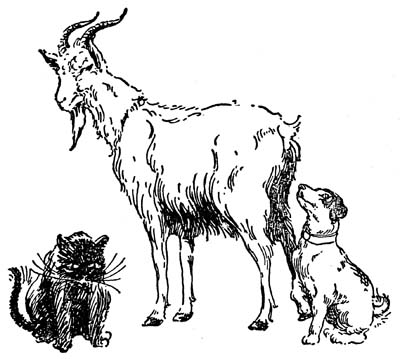
THE END
ZIP
The Adventures of a Frisky Fox Terrier
BY FRANCES TREGO MONTGOMERY
The Well-Known Author of
THE BILLY WHISKERS SERIES
Zip is the adventure-loving, frolicsome pet of the popular doctor of a small village. He goes wherever his master goes—and ventures to undertake much at which the physician would shake his head in fear. In fact, Zip dares anything and anybody. He is known and beloved by all the village folk, who are kept on the qui vive wondering what will be Zip’s next outbreak.
His life is far from one of peace. The unexpected is continually happening—every page bristles with the unusual adventures of this active little, dear little, frisky little Zip. He will be found to be a splendid story-book play-fellow by every boy and girl.
Quarto, bound in boards, with cover, jacket and four full-page illustrations in colors—$.60 postpaid.
The Saalfield Publishing Company
AKRON, OHIO
Billy Whiskers Series
(Trade Mark.)

By Frances Trego Montgomery
BILLY WHISKERS
Billy Whiskers is a mischievous creature, full of wickedness and folly, whose antics have furnished fun for a million readers. The child enjoys every moment after he is introduced to the irresistible fellow.
BILLY WHISKERS’ KIDS
“Recounting the adventures of Day and Night, twin kids of the nursery-famous Billy Whiskers. This is a stirring tale of travel and trouble and mischief that will delight the little world.”—Galveston News.
BILLY WHISKERS, JR.
“Night, now grown, is known as Billy Whiskers, Jr. and as he has all the personal traits which made his father’s career one round of surprising activity and astonishing adventure, the son will be quite as well beloved as his sire.”—Chicago Record Herald.
BILLY WHISKERS’ TRAVELS
In which the ever active Billy tours Europe, each city in turn furnishing ample opportunity for fun for sight-seeing Billy.
BILLY WHISKERS AT THE CIRCUS
“Everything goes well enough with Billy until a circus comes to town, and then just like the small boy, he made up his mind to go, come what might and cost what it would. He made preparations for a week and went, there to meet with all manner of adventures, becoming so infatuated with the life that he joined it.”—Des Moines Capital.
BILLY WHISKERS AT THE FAIR
In going to the Fair, Billy Whiskers didn’t leave a single prank at home. He had more fun to the minute than most others have to the hour. What he didn’t do and didn’t see is not worth relating.
Each volume bound in boards, cover and jacket in colors, six full-page illustrations in colors, with scores of text drawings, quarto, postpaid, per volume $1.25
THE SAALFIELD PUBLISHING CO., AKRON, OHIO
Billy Whiskers Series
(Trade Mark.)

By Frances Trego Montgomery
BILLY WHISKERS’ FRIENDS
This story of how Billy Whiskers and his wife Nannie journey west in search of their son, Billy Whiskers, Jr., teems with exciting incident and ludicrous situation.
BILLY WHISKERS, JR. AND HIS CHUMS
The Chums are a black cat and a yellow dog, and together this trio make a trip from San Francisco immediately after the great earthquake back to Billy’s former home in the east.
BILLY WHISKERS’ GRANDCHILDREN
Being a laughable record of the adventures that come to Punch and Judy, Billy’s grandchildren.
BILLY WHISKERS’ VACATION
Promising his faithful wife to be back within a year and a day, active Billy starts on another ramble, to meet as many exciting adventures as in his younger days.
BILLY WHISKERS KIDNAPED
Because Billy is a valuable goat, two men determine to kidnap him, and after many attempts they succeed. The Chums unearth the plot, and take up the trail—but what happens it is the right of the author to tell in her own charming way.
BILLY WHISKERS’ TWINS
Billy’s twin children go to a famous summer resort, now being owned by children who sojourn there each year. Father Billy and the Chums follow, and the five make merry during the season, enjoying it fully as much as any of the cottagers.
BILLY WHISKERS IN AN AEROPLANE
Billy keeps step with the progress of the world, and here we find him making a cross-country flight in an aeroplane race, with the Chums in rival machines.
Each volume in boards, cover and jacket in colors, six full-page illustrations in colors, with scores of text drawings, quarto, postpaid, per volume $1.25
THE SAALFIELD PUBLISHING CO., AKRON, OHIO
FRANCES TREGO MONTGOMERY’S BOOKS
The Wonderful Electric Elephant
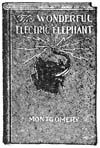
“A new and fascinating sort of fairy story.”—Salt Lake Tribune.
“A book in which youth will take keen pleasure.”—The Bookseller.
Among the tales of travel for boys and girls there are few which record such strange adventures as befell the owners of the wonderful Electric Elephant.
By a fortunate chance, Harold Fredericks comes into possession of a wonderful mechanical elephant, so ingeniously contrived that it will pass for a real animal, even under closest inspection. The interior is fitted up luxuriously, affording the finest accommodations for Harold and the traveling companion whom he secures by another lucky chance. The young folks have a journey quite unlike any on record, meeting adventures both on land and sea.
The boy or girl who wants something new in the story line will surely find it in this chronicle.
Elaborately illustrated with 50 full-page halftones, bound in cloth, 12mo, postpaid $1.50
ON A LARK TO THE PLANETS
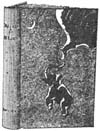
“The colored illustrations are a feature of delight.”—Grand Rapids Herald.
“This sprightly author holds the record for inventiveness.”—Philadelphia Item.
Some time ago a book appeared which has been a delight to thousands of boys and girls. It was “The Wonderful Electric Elephant.” Frances Trego Montgomery has published a sequel to that book and calls it “On a Lark to the Planets.” The contents of this new volume makes a feast for the young mind, telling of a journey Harold and Ione took to the planets.
“As a gift book to the children, nothing could be more desirable. It is an assurance of happiness for any young person to be the possessor of this charming story.”—Birmingham Ledger.
Beautifully illustrated in colors, bound substantially in cloth, 12mo, postpaid $1.50
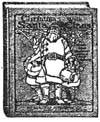
A CHRISTMAS WITH SANTA CLAUS
The Buffalo Courier says:
“Frances Trego Montgomery has the happy faculty of knowing what the small boy and his sister like in the way of fiction.”
“A CHRISTMAS WITH SANTA CLAUS” is the title of an ideal Christmas book by Frances Trego Montgomery, illustrated in colors in a most bewitching way.
The story recites the adventures of Jack and Gladys, whom Santa picks up and whisks away to the Northland. There they make the acquaintance of Mrs. Santa, and help fill the Saint’s chimney bags. When all is ready and the sleigh is packed, they accompany old Santa on his annual trip.
“If you doubt the joys of a ‘Christmas with Santa Claus,’ read of the pleasures that awaited two little waifs the big-hearted Christian saint gathered into his home. Mrs. Montgomery introduces you to his motherly wife. She is as good as another grandmother. Try her!”—New York World.
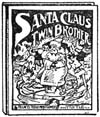
SANTA CLAUS’ TWIN BROTHER
Boston Ideas says:
“Mrs. Montgomery’s ideas are touched with the sparkle of real genius. It’s a delight to travel in her company.”
Can anyone make a better play-fellow than Santa himself? That is the question every child ponders after reading “A Christmas with Santa Claus.” And likely they would ask it in vain if Mrs. Montgomery had not written “Santa Claus’ Twin Brother.” This lively story convinces them that there is one other who enters into their moods just as thoroughly as the merry old fellow with ruddy face and snowy beard, and why should he not, for he is Kris Kringle, twin brother of Santa.
Four little children are fortunate enough to have a frolic with these two merry fellows, and their laughter rings through every page of the captivating story.
Each volume illustrated in colors, with colored cover and jacket, quarto, bound in boards postpaid, per volume $1.00
THE SAALFIELD PUBLISHING CO., AKRON, OHIO
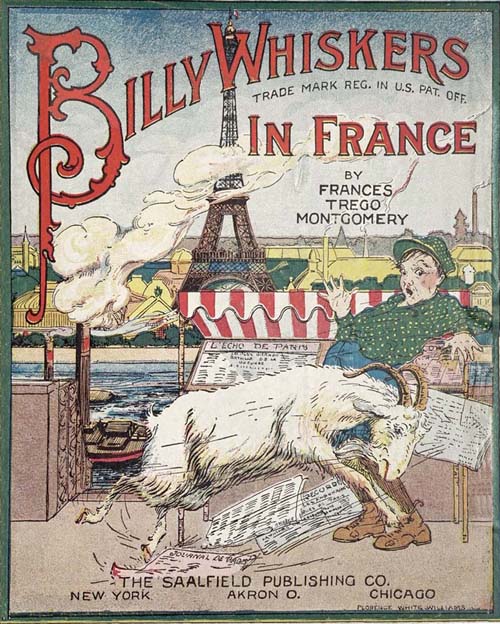
TRANSCRIBER’S NOTES:
Obvious typographical errors have been corrected.
Inconsistencies in hyphenation have been standardized.
This eBook is for the use of anyone anywhere in the United States and most other parts of the world at no cost and with almost no restrictions whatsoever. You may copy it, give it away or re-use it under the terms of the Project Gutenberg License included with this eBook or online at www.gutenberg.org. If you are not located in the United States, you will have to check the laws of the country where you are located before using this eBook.